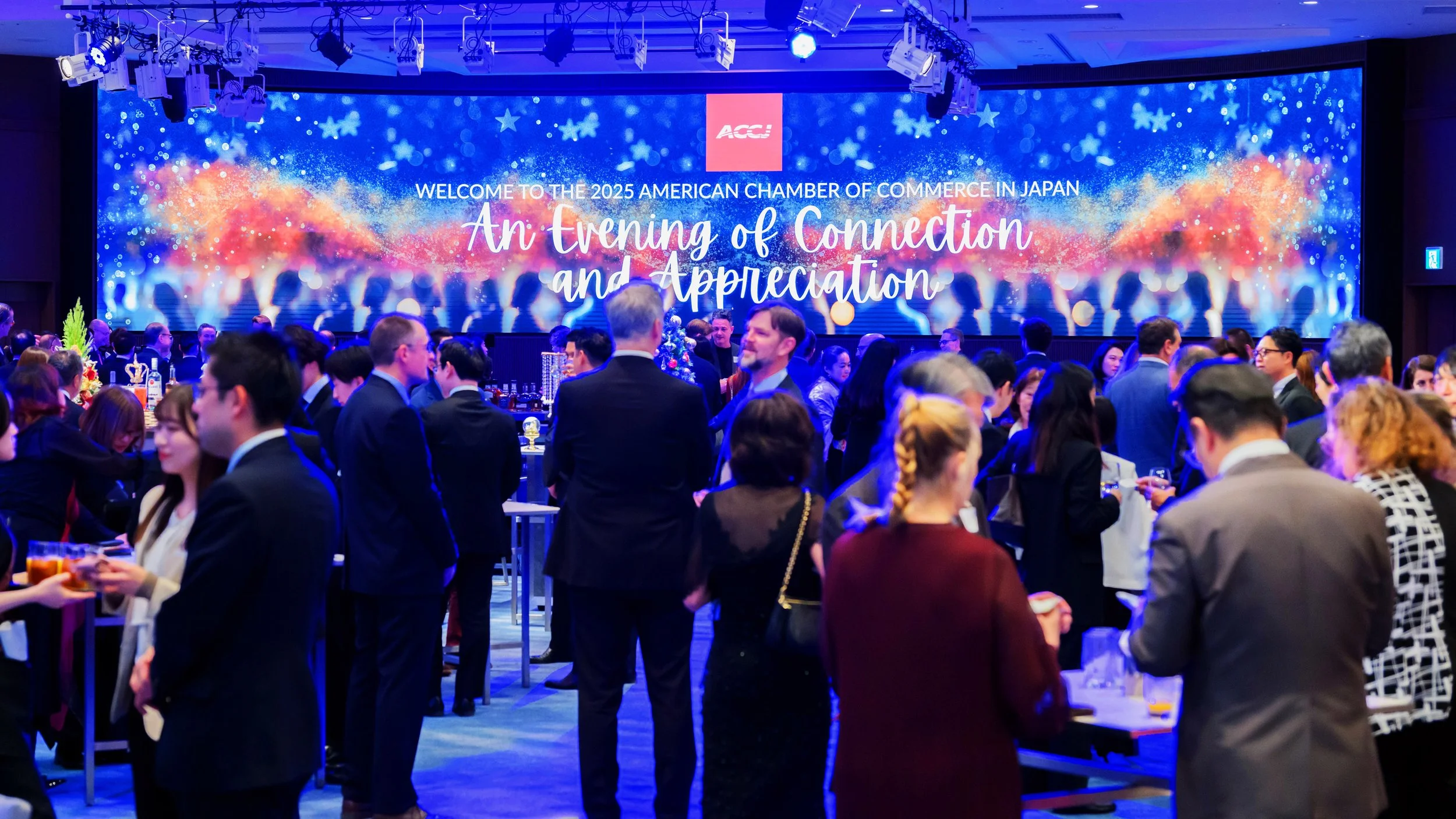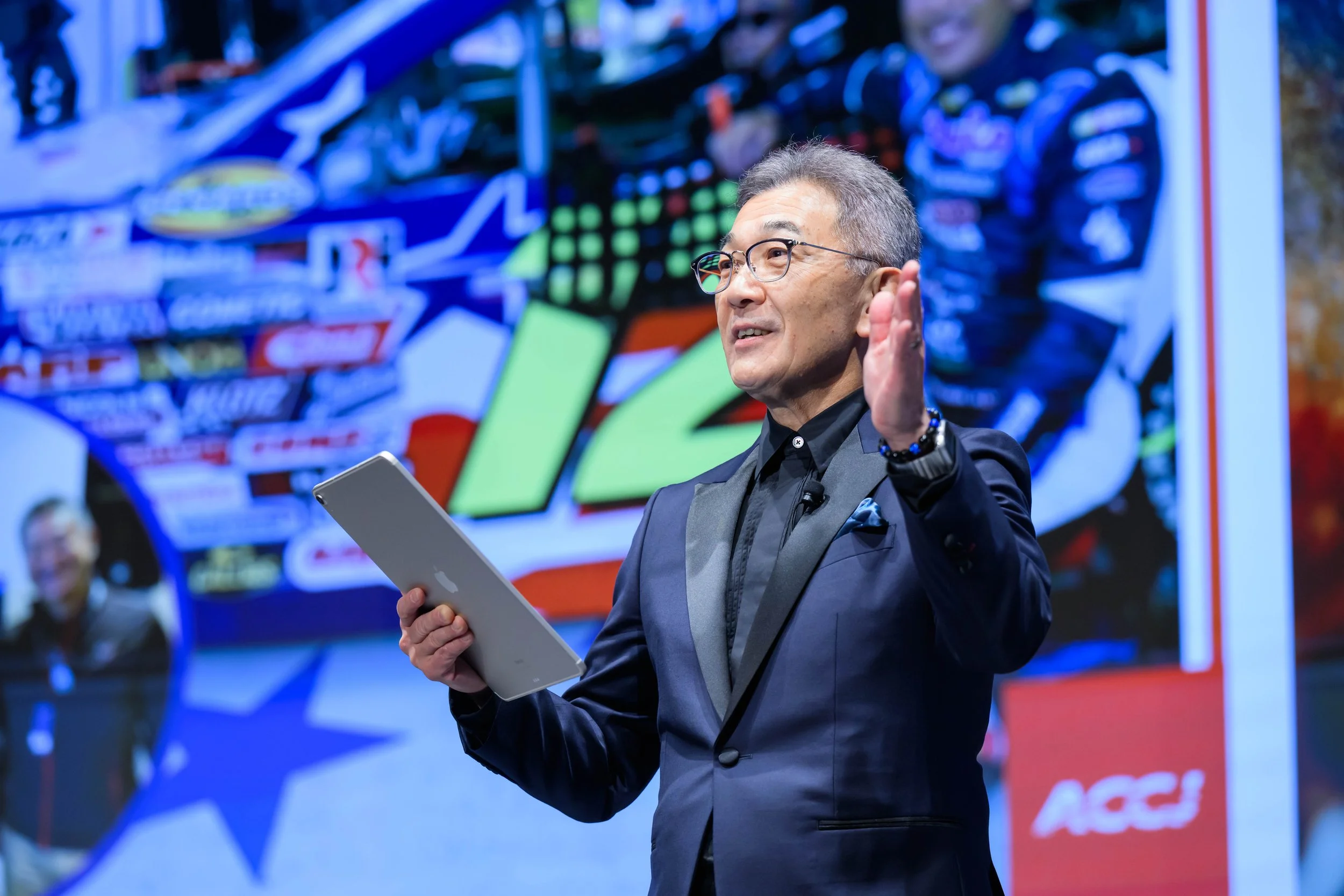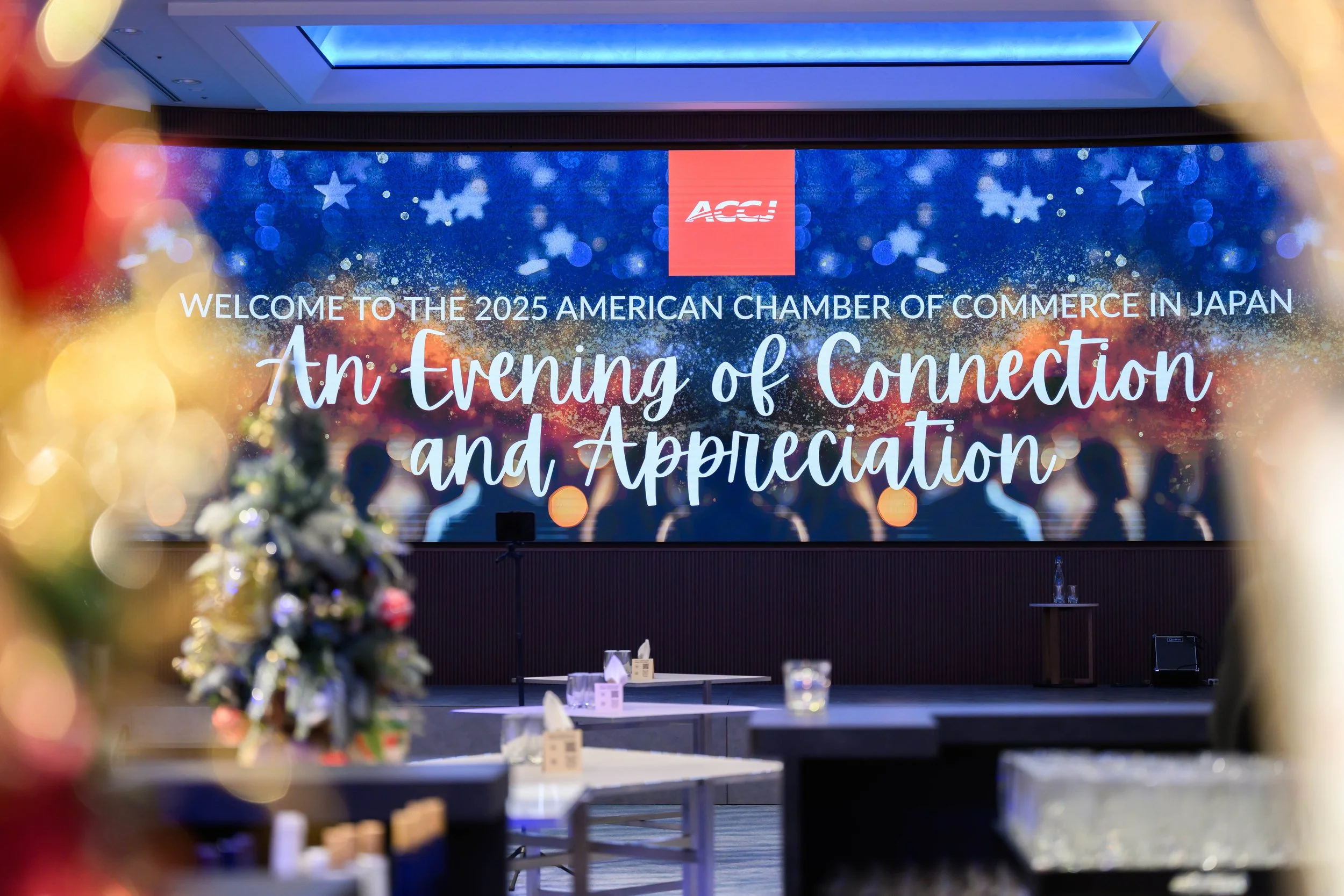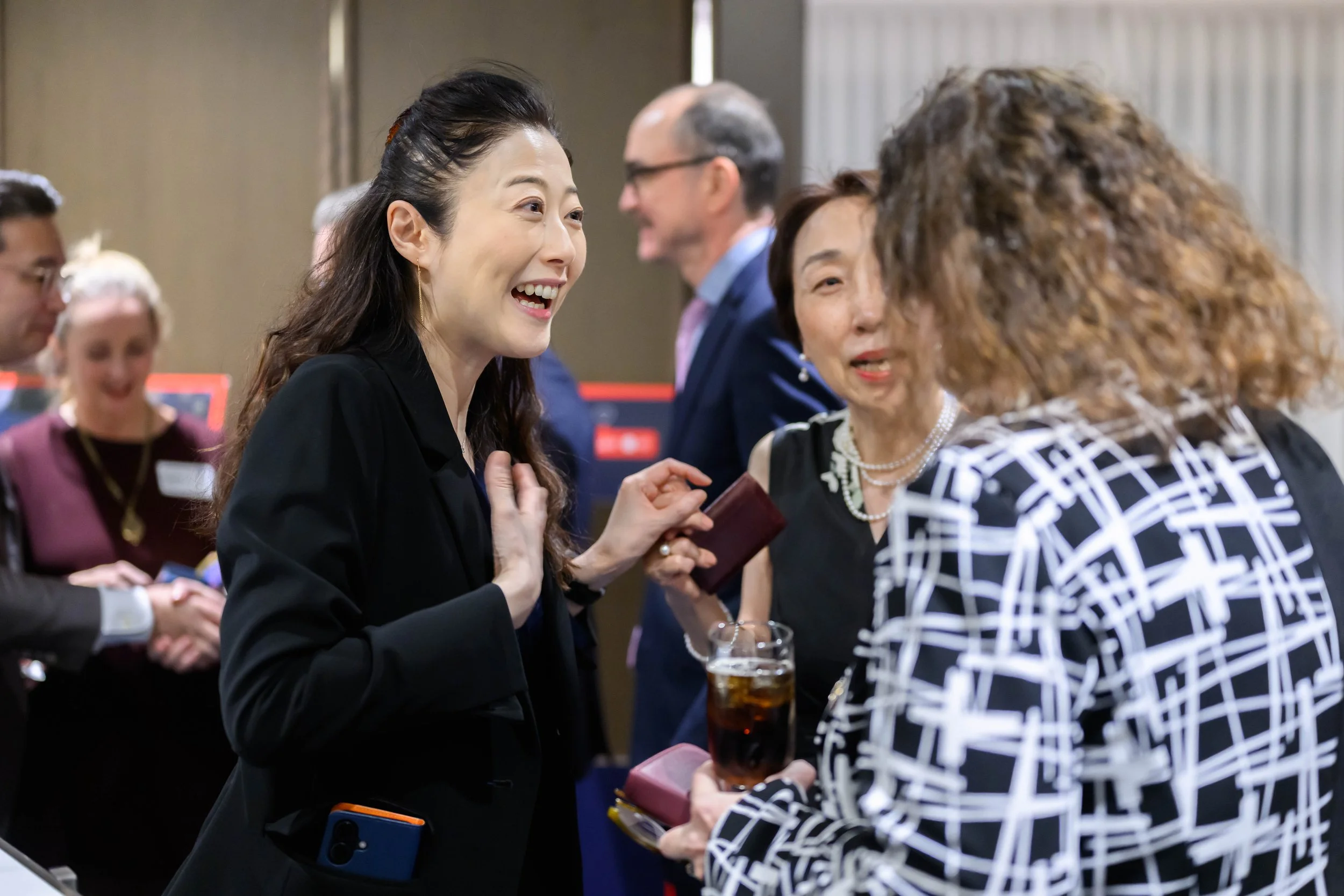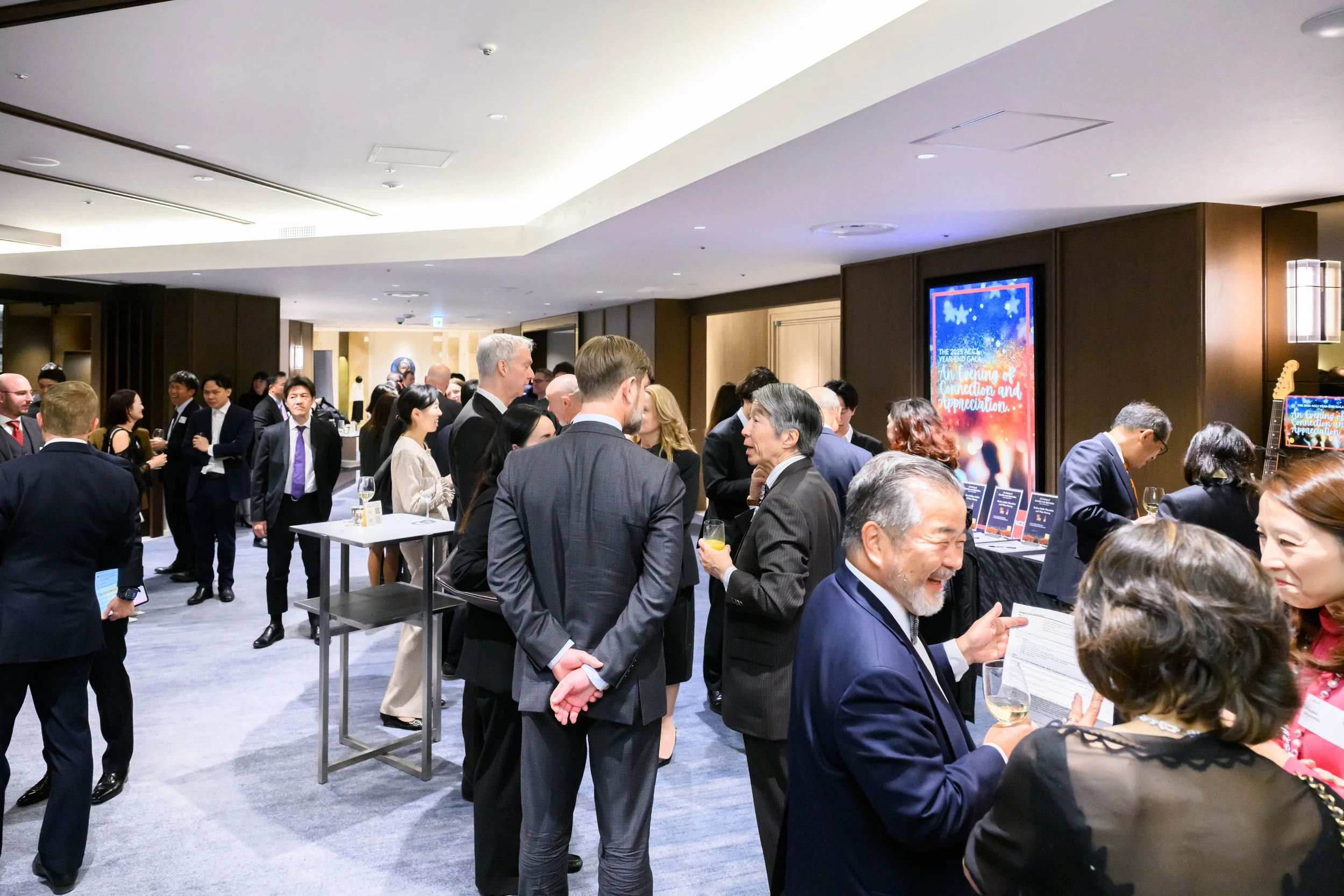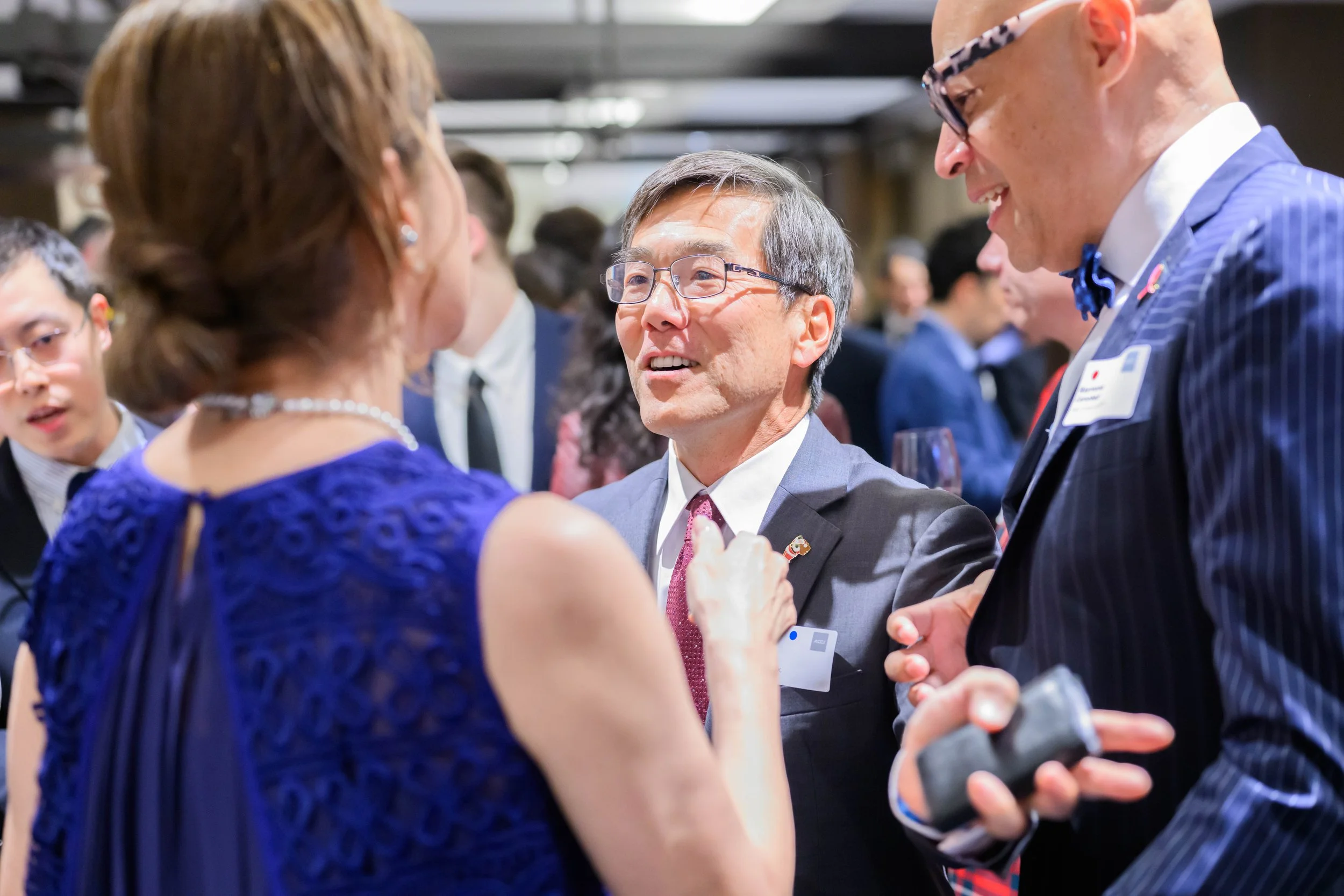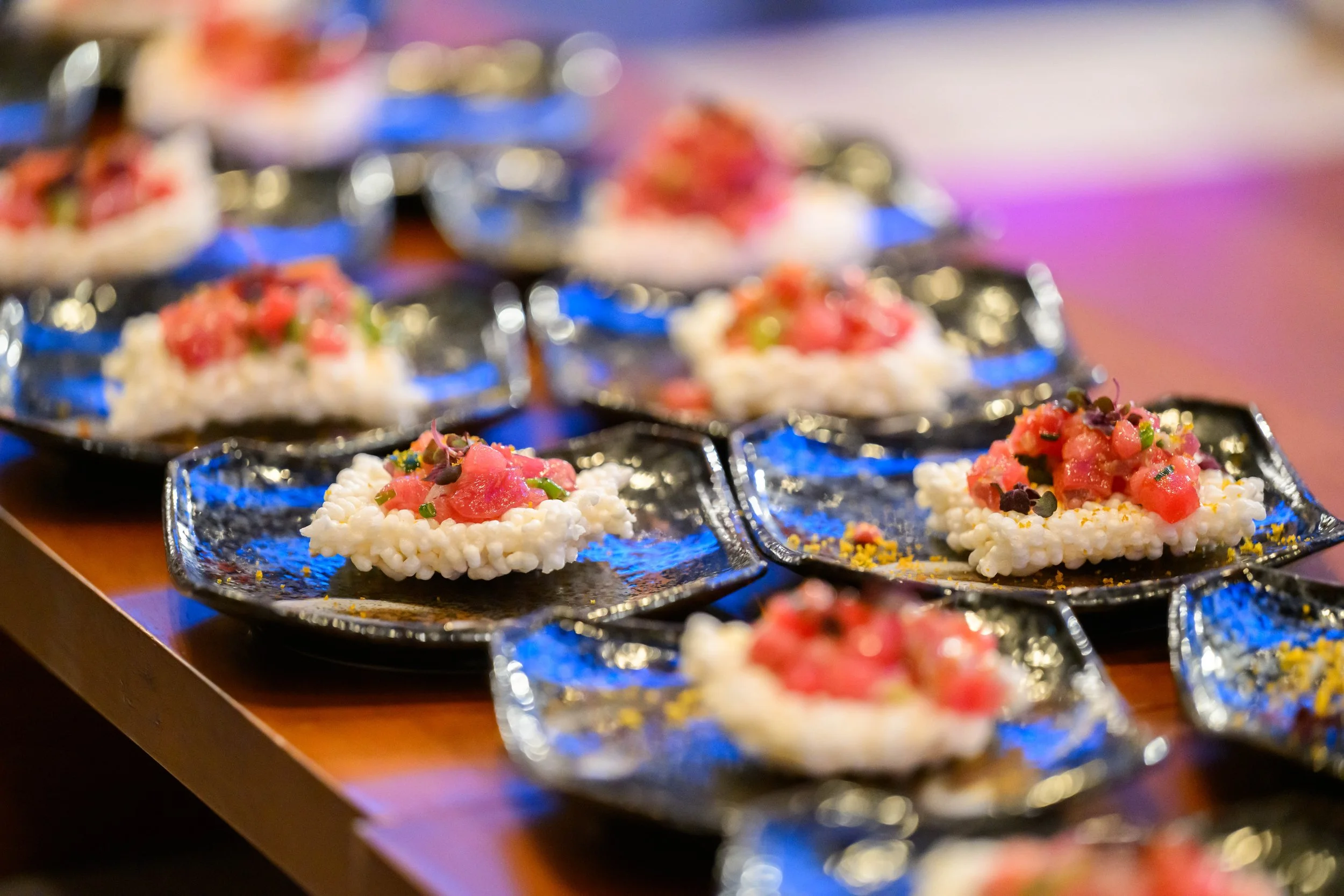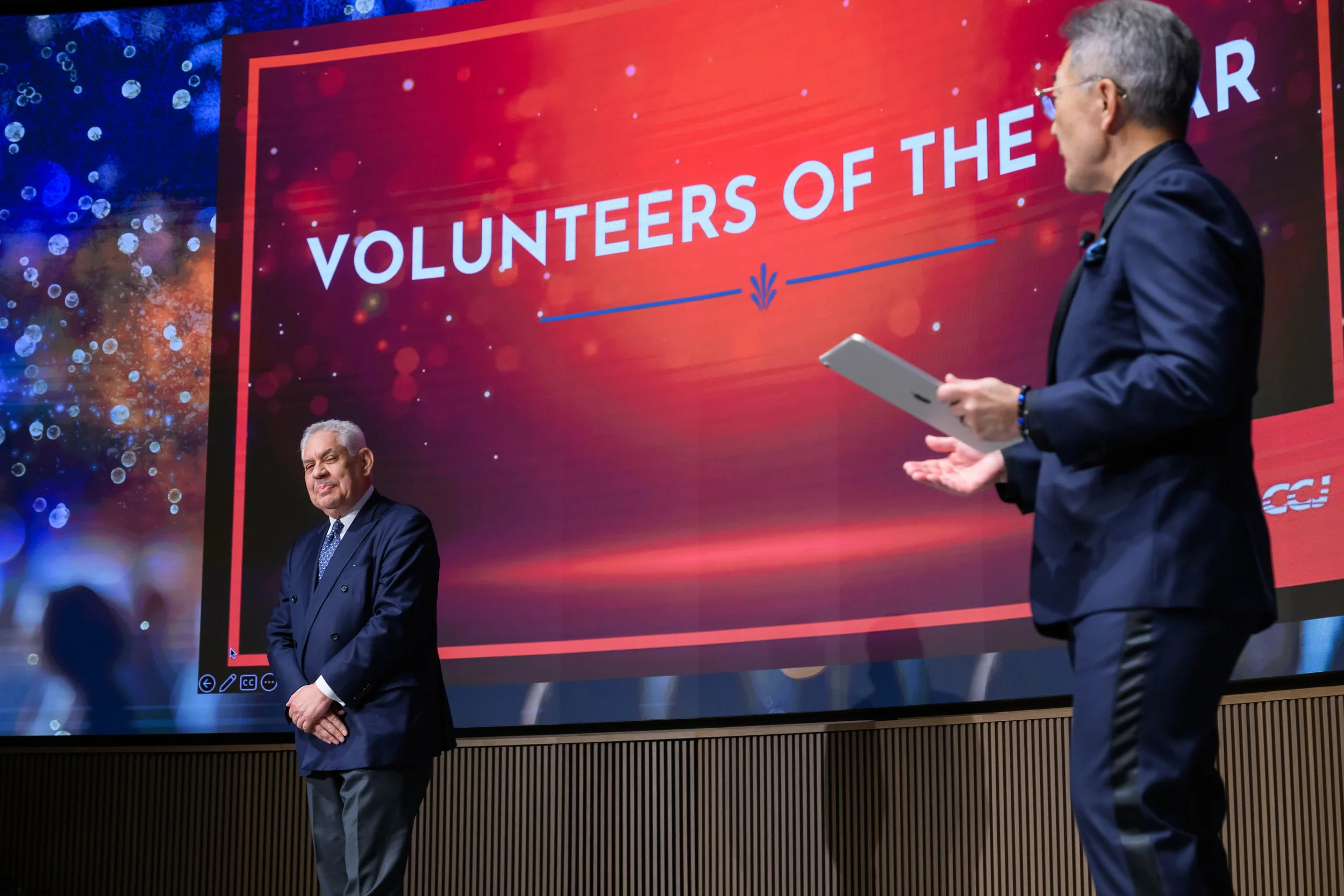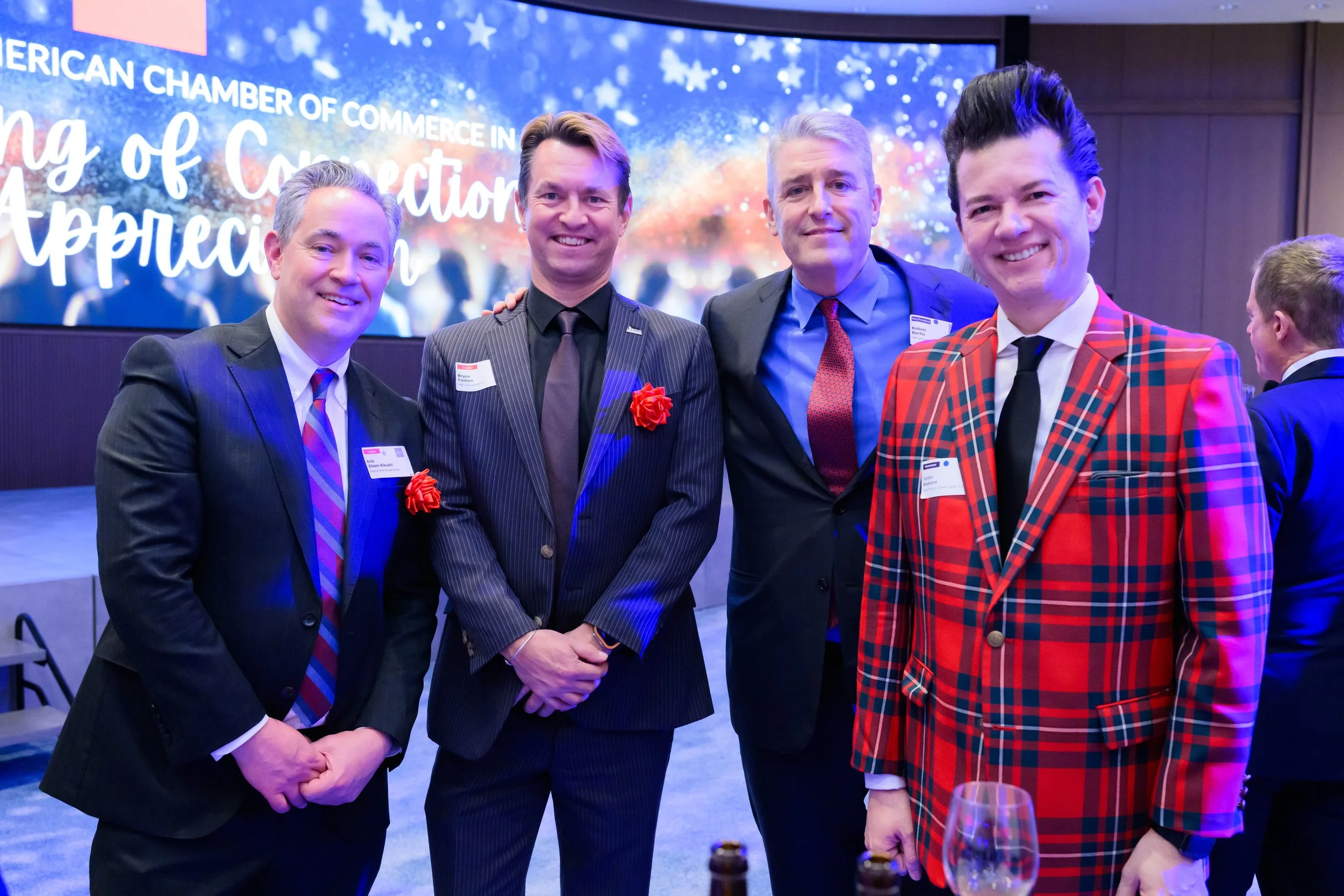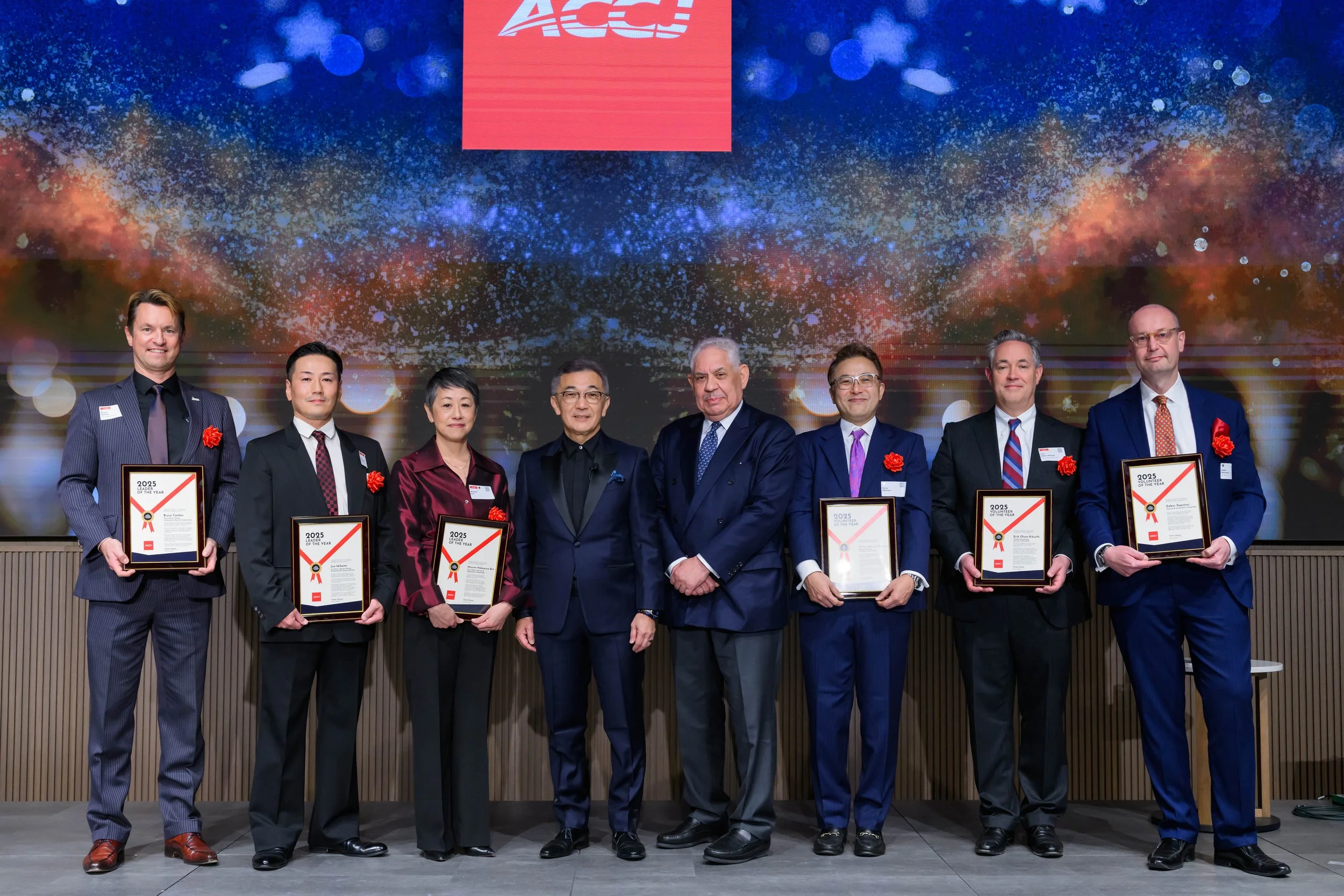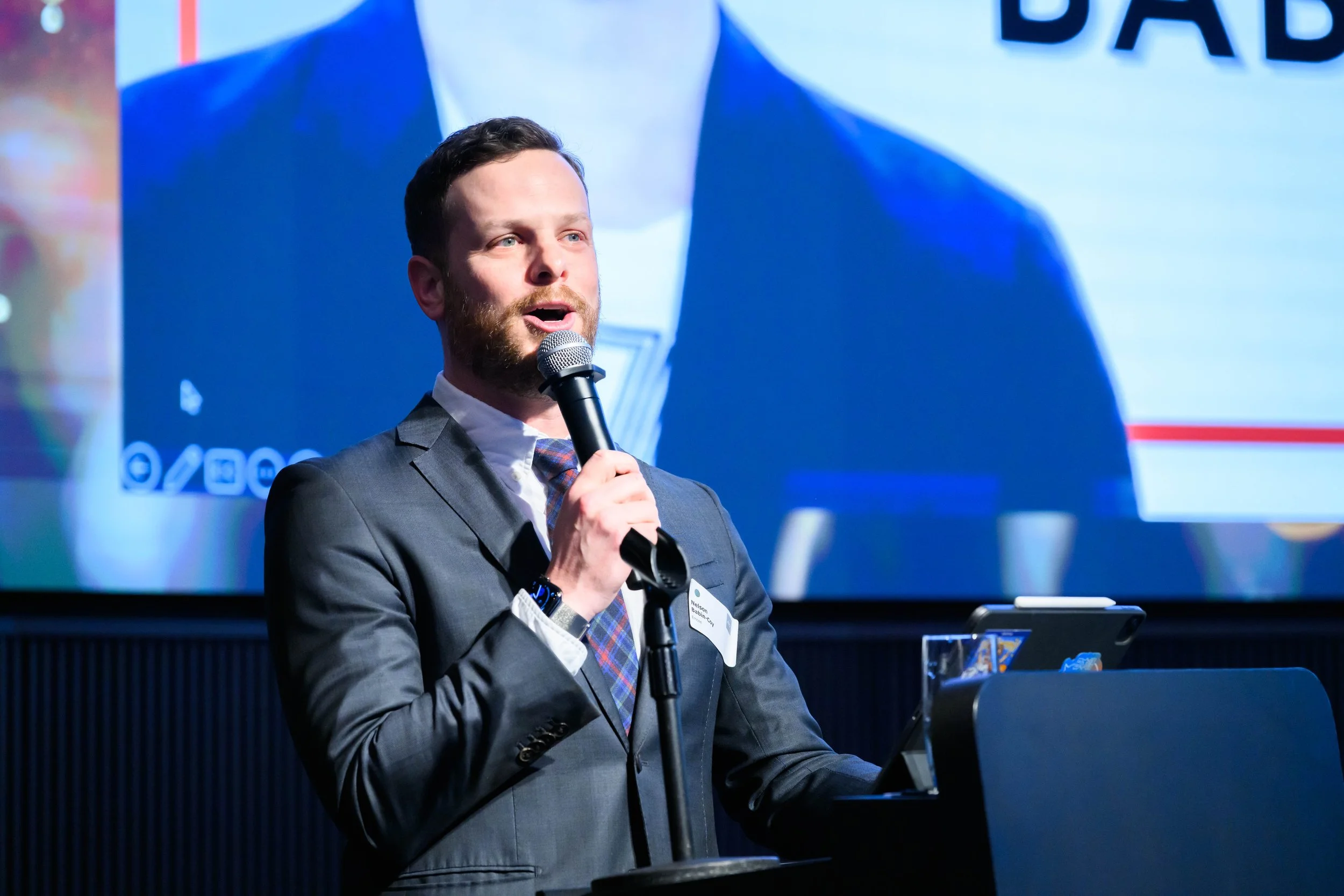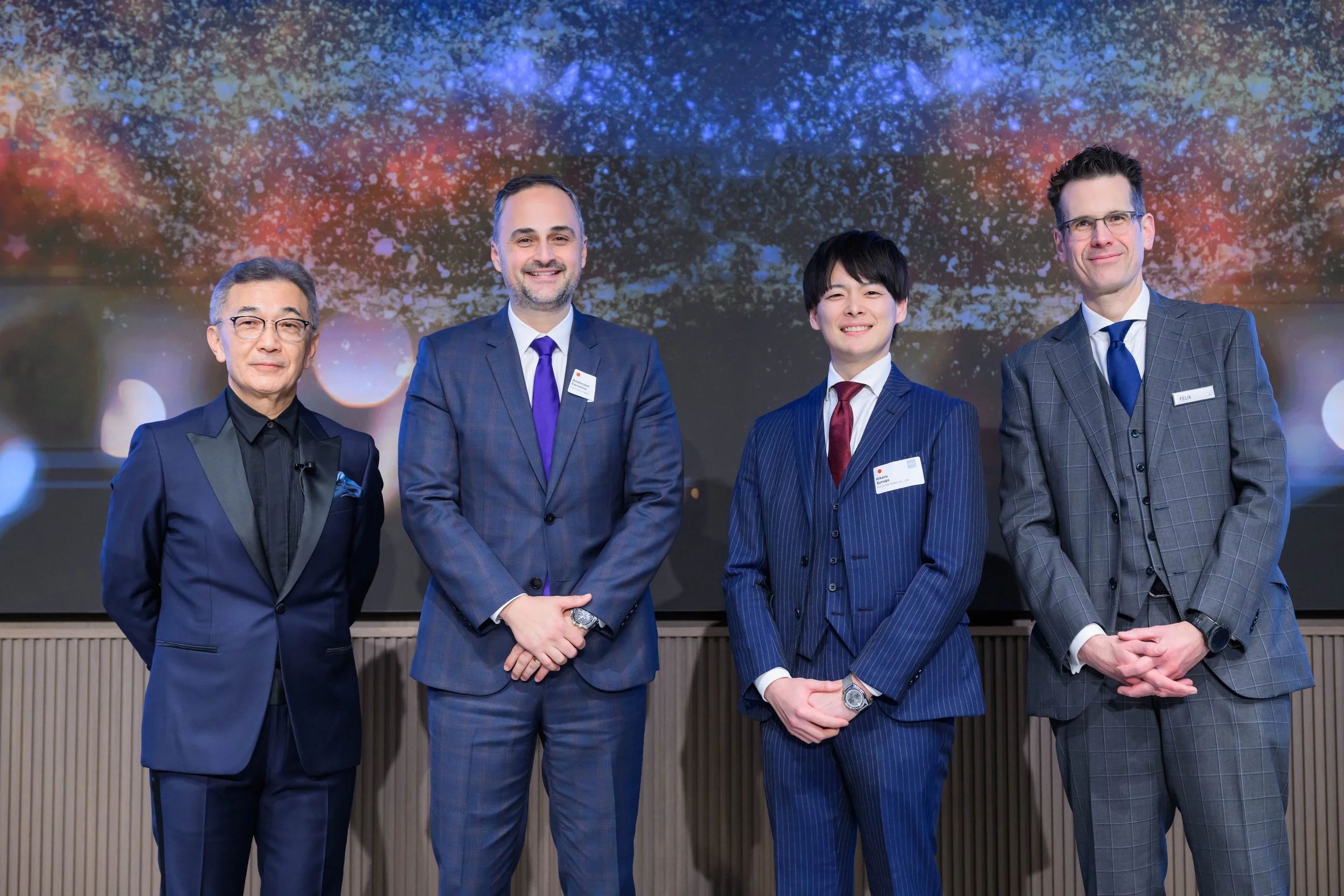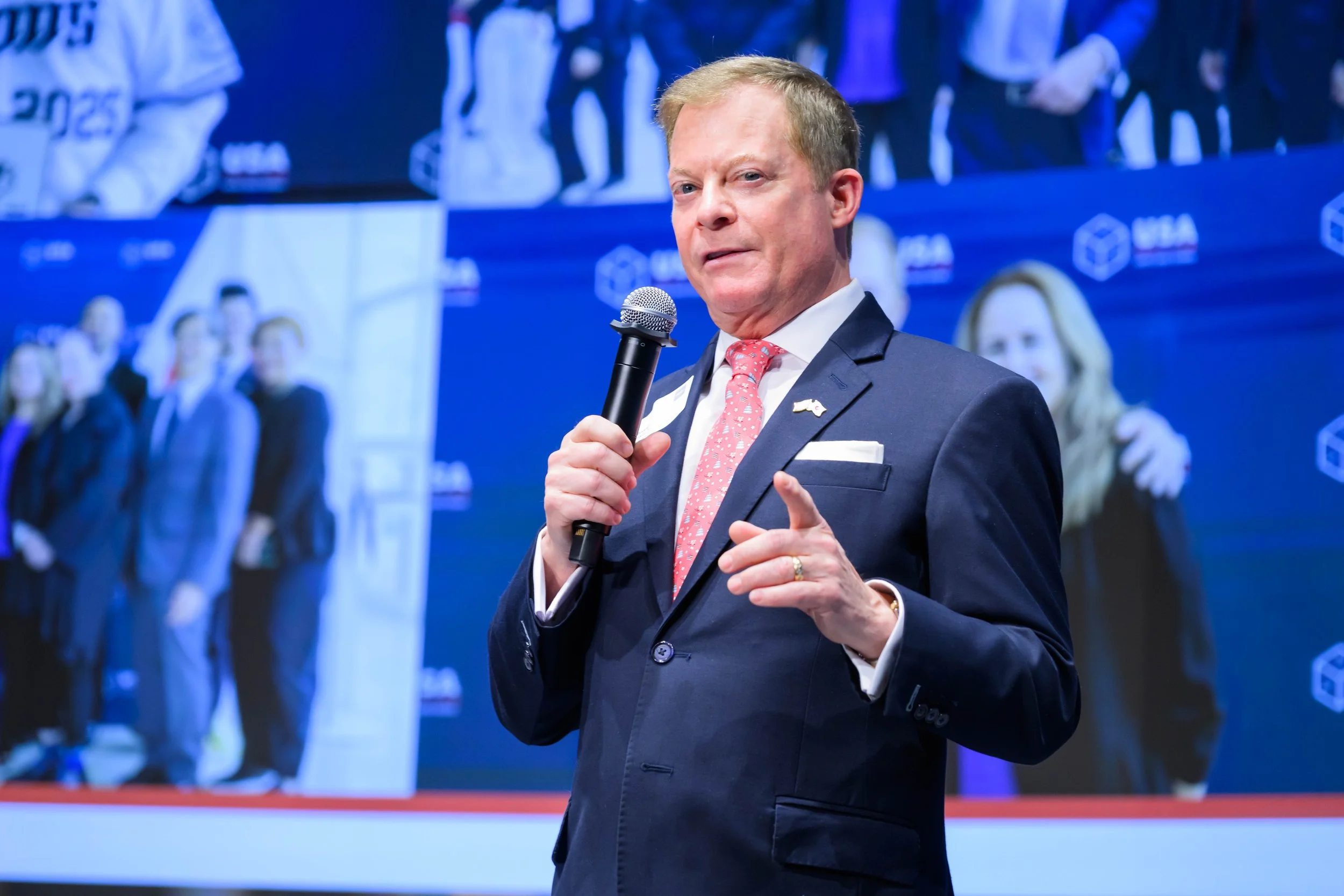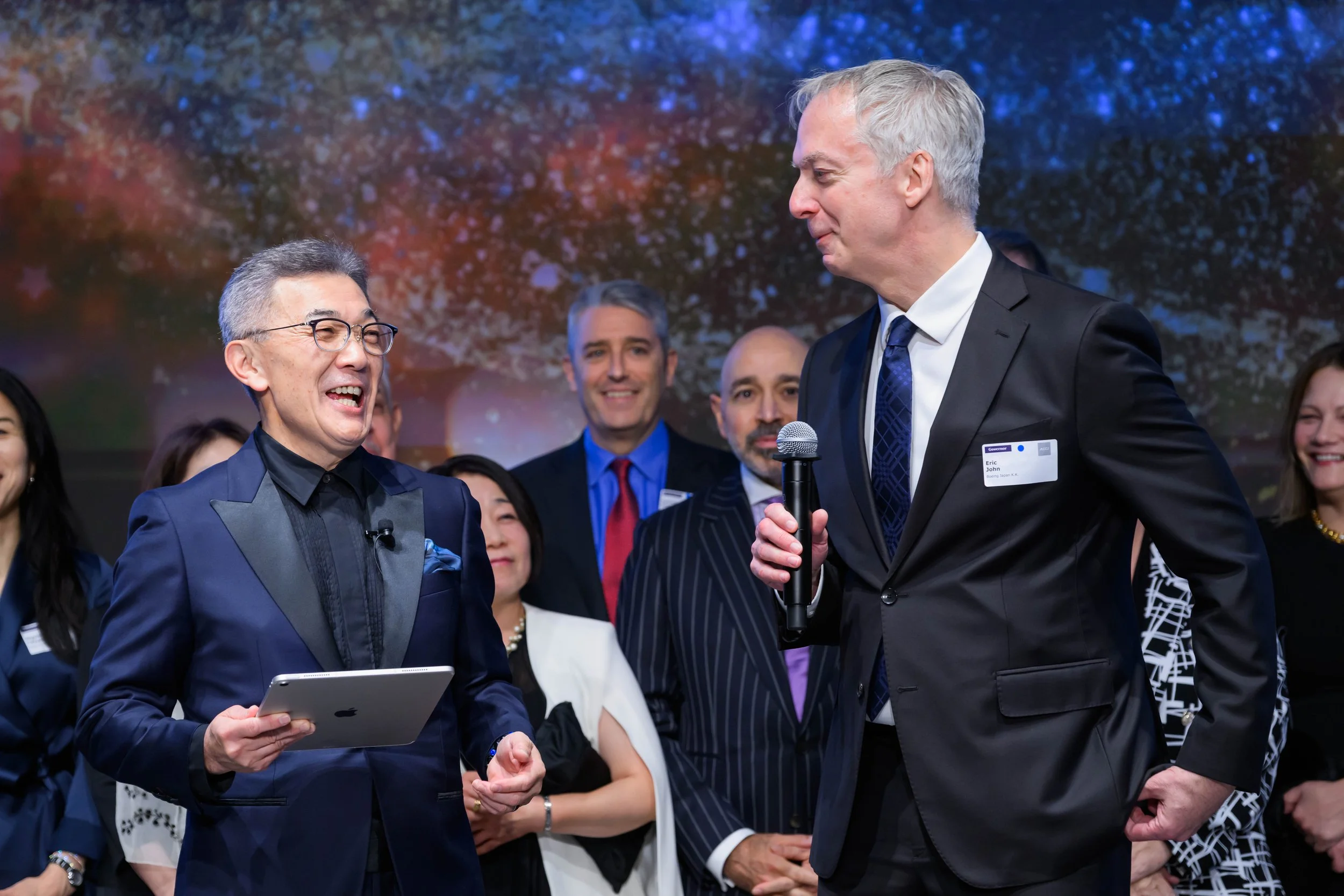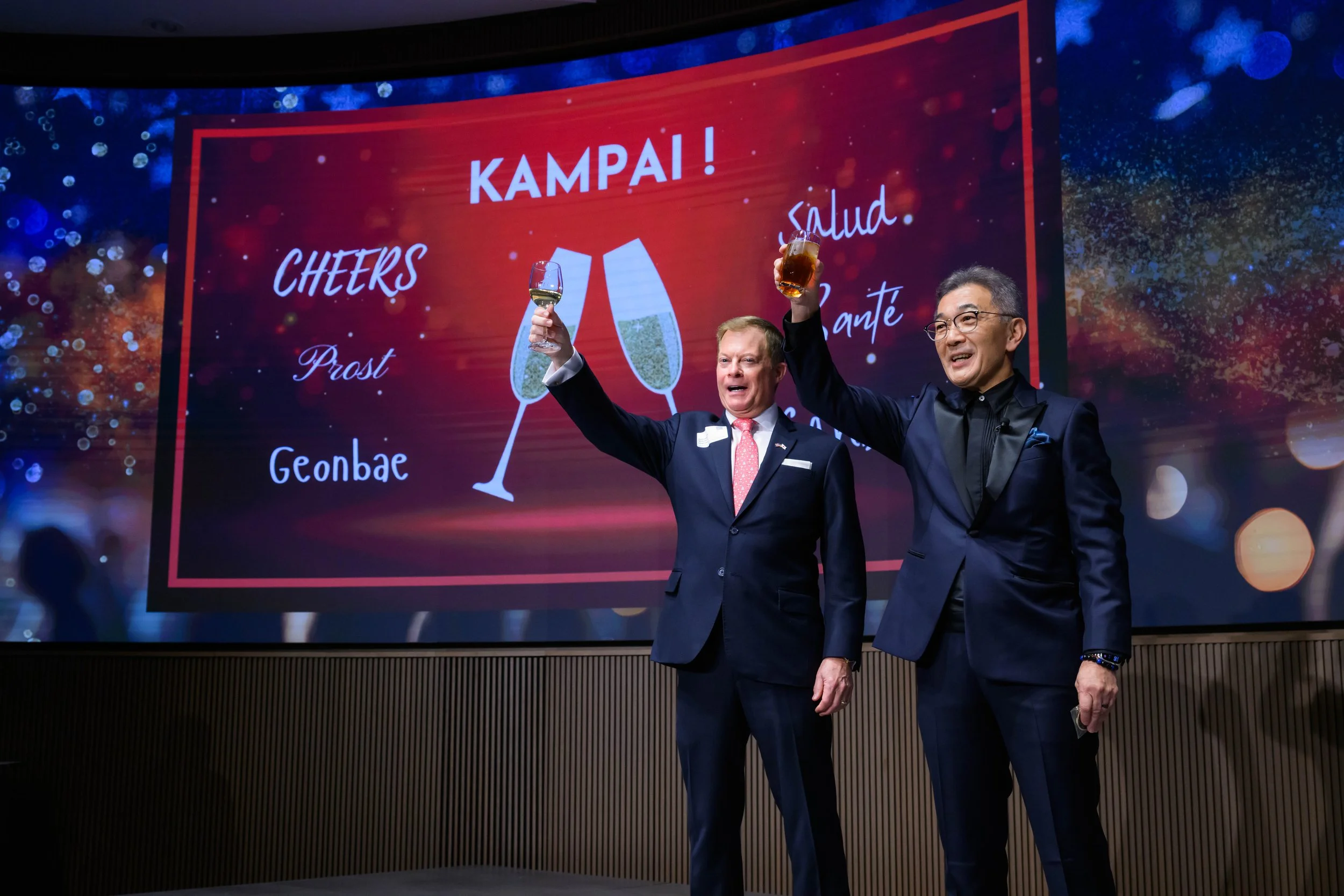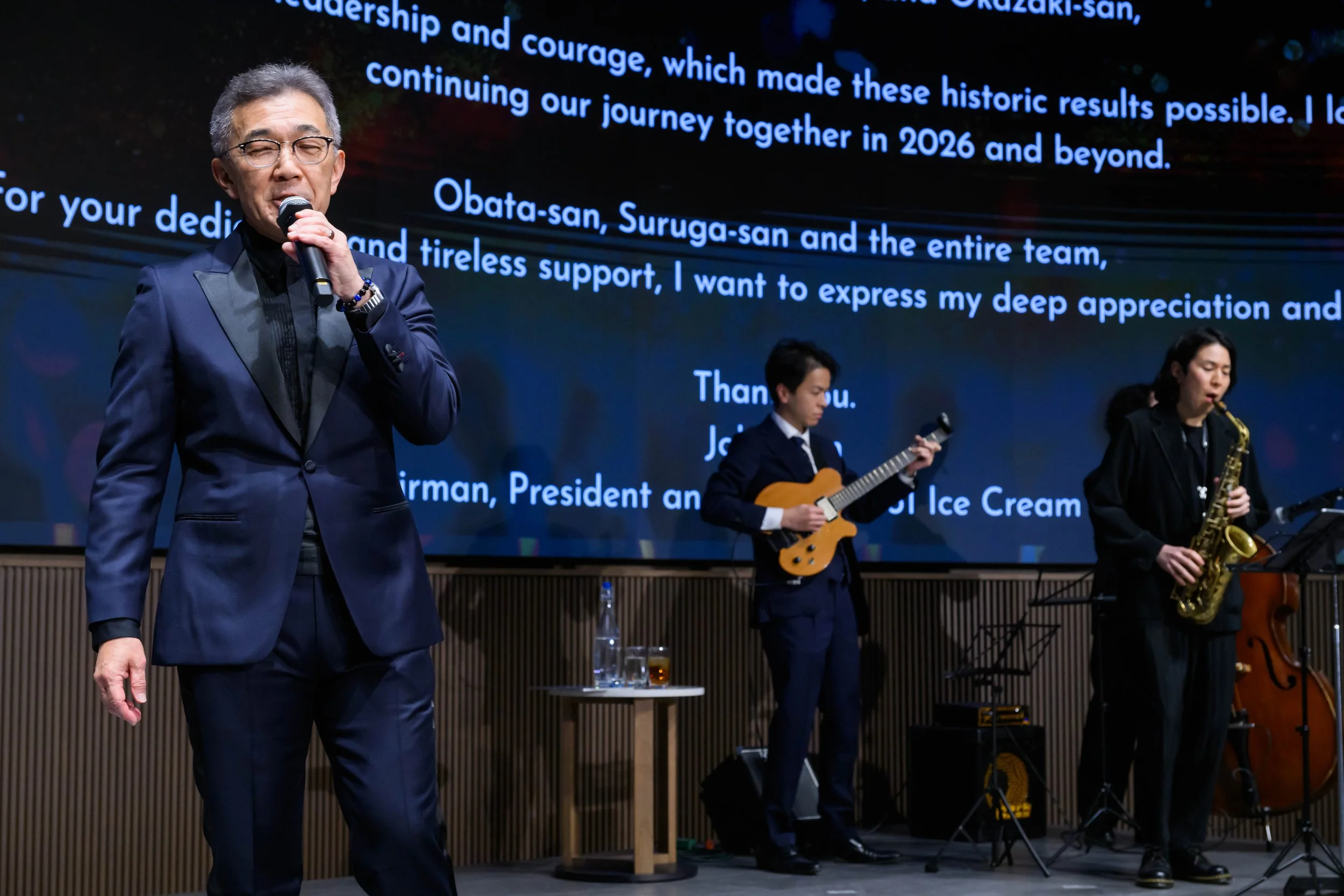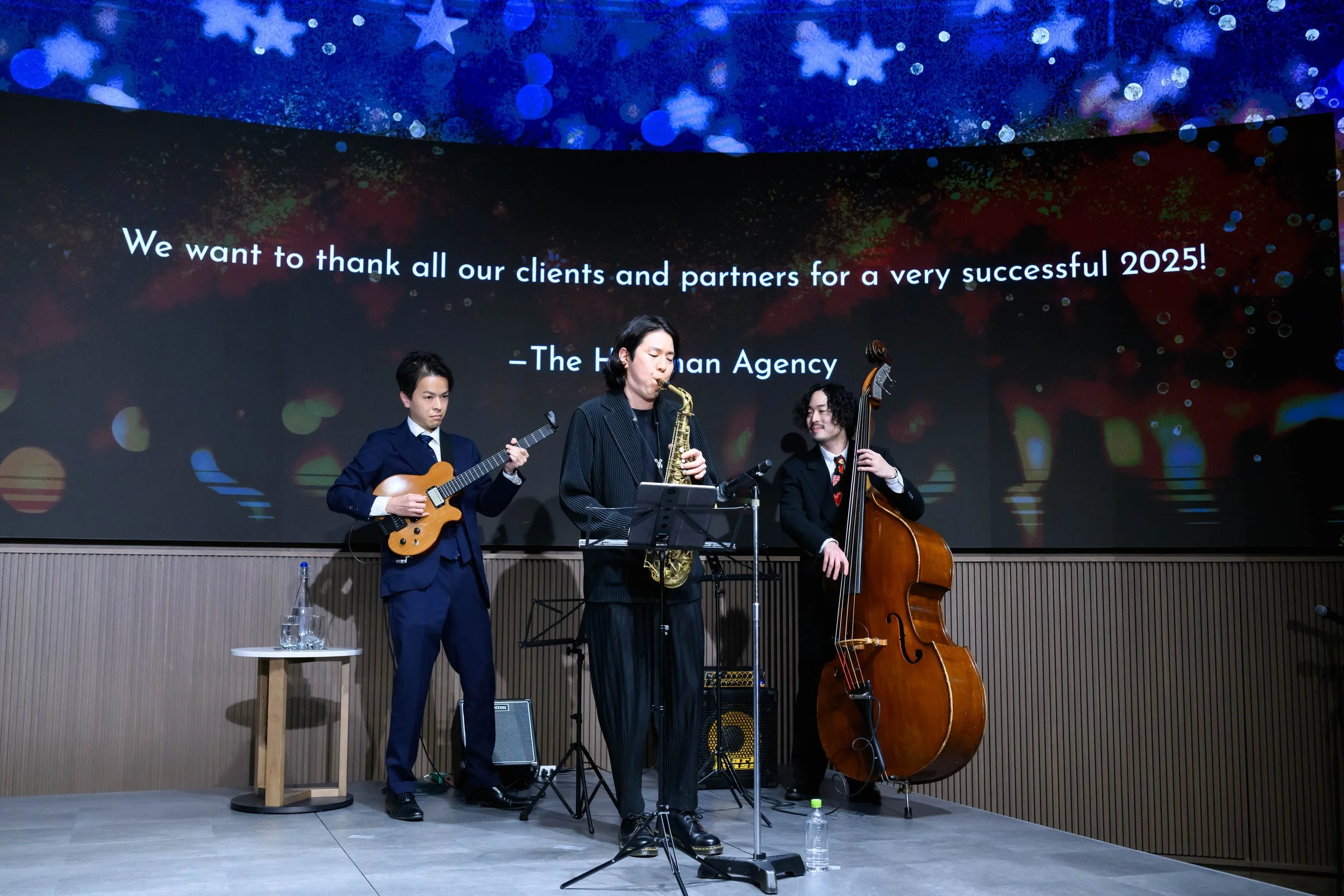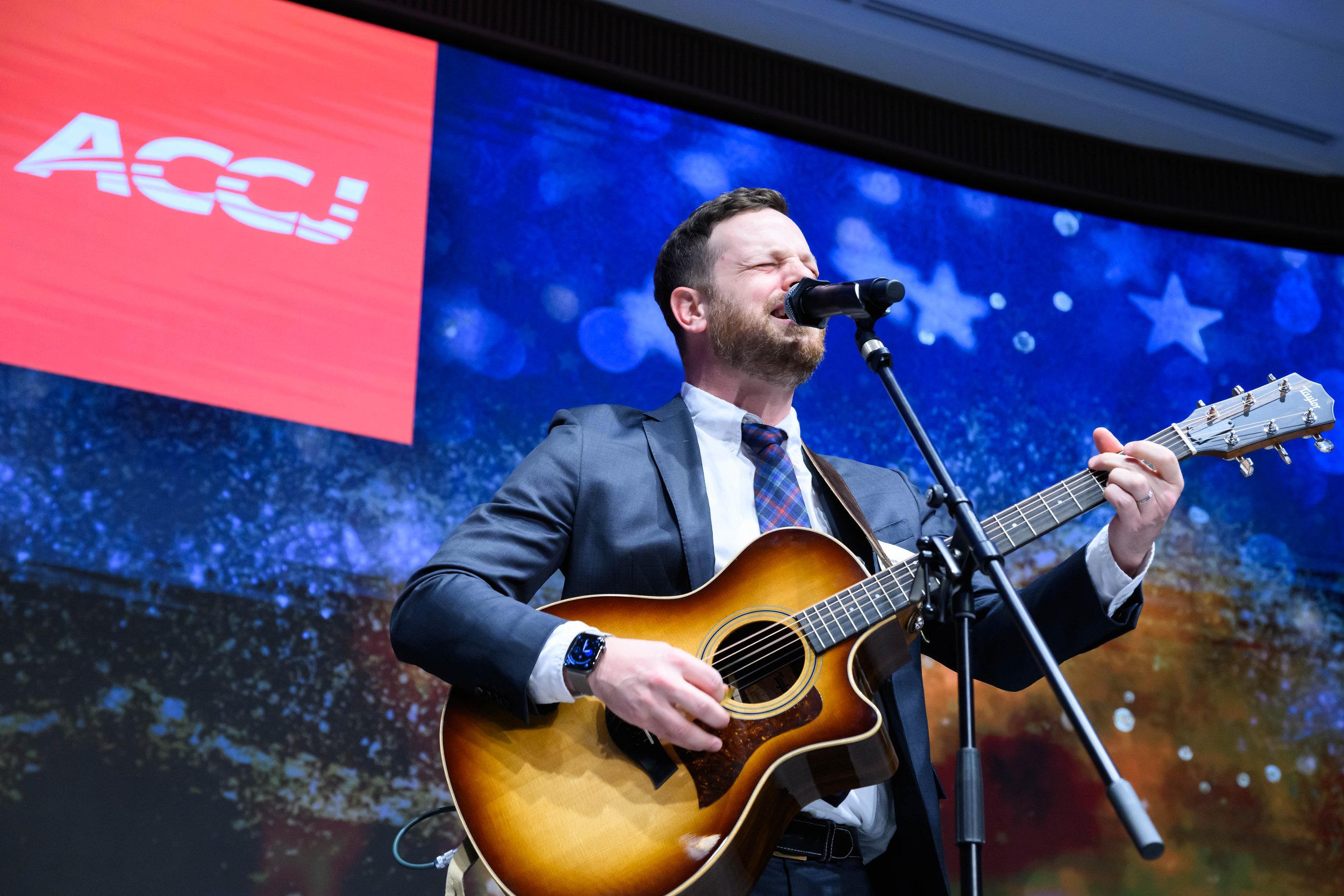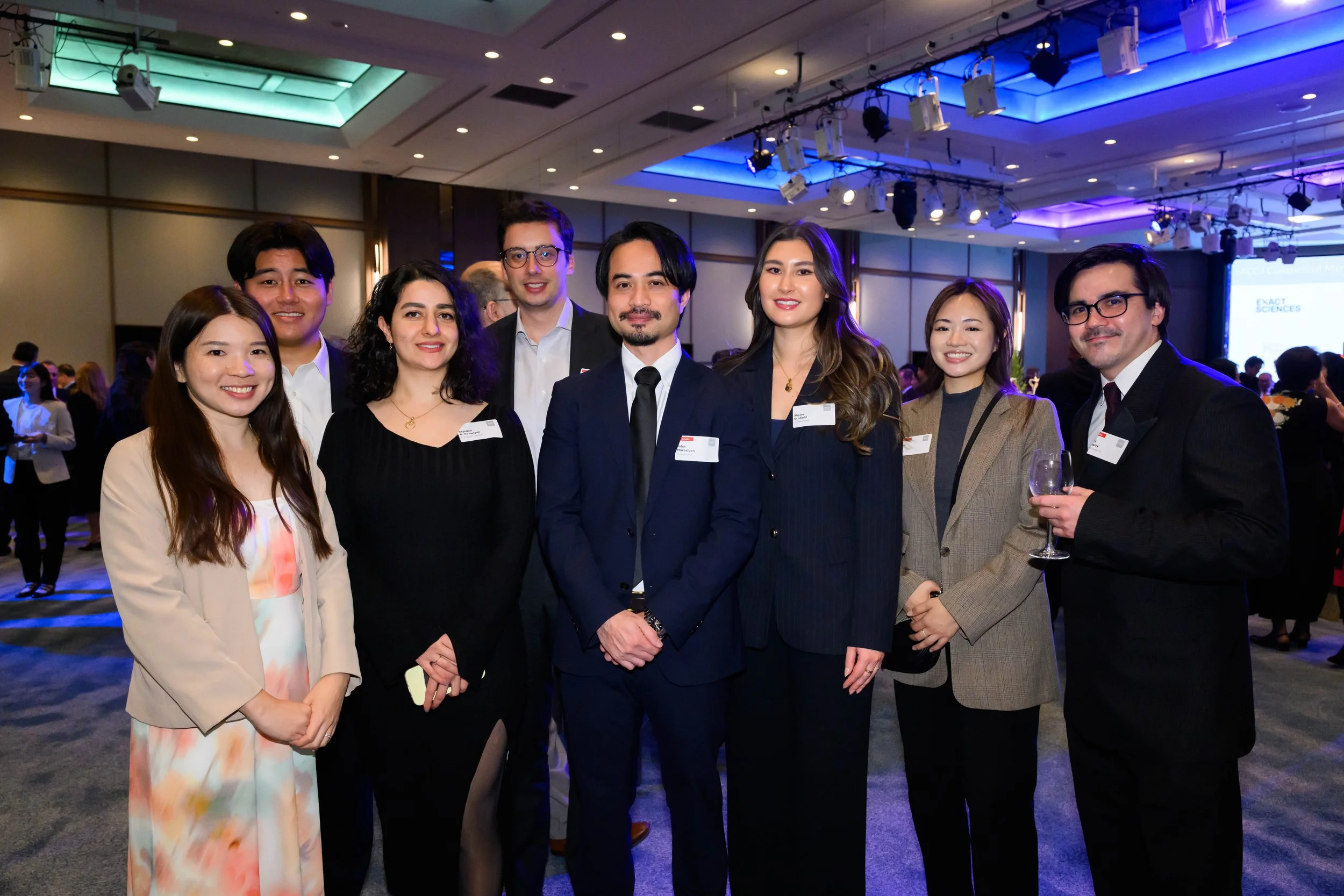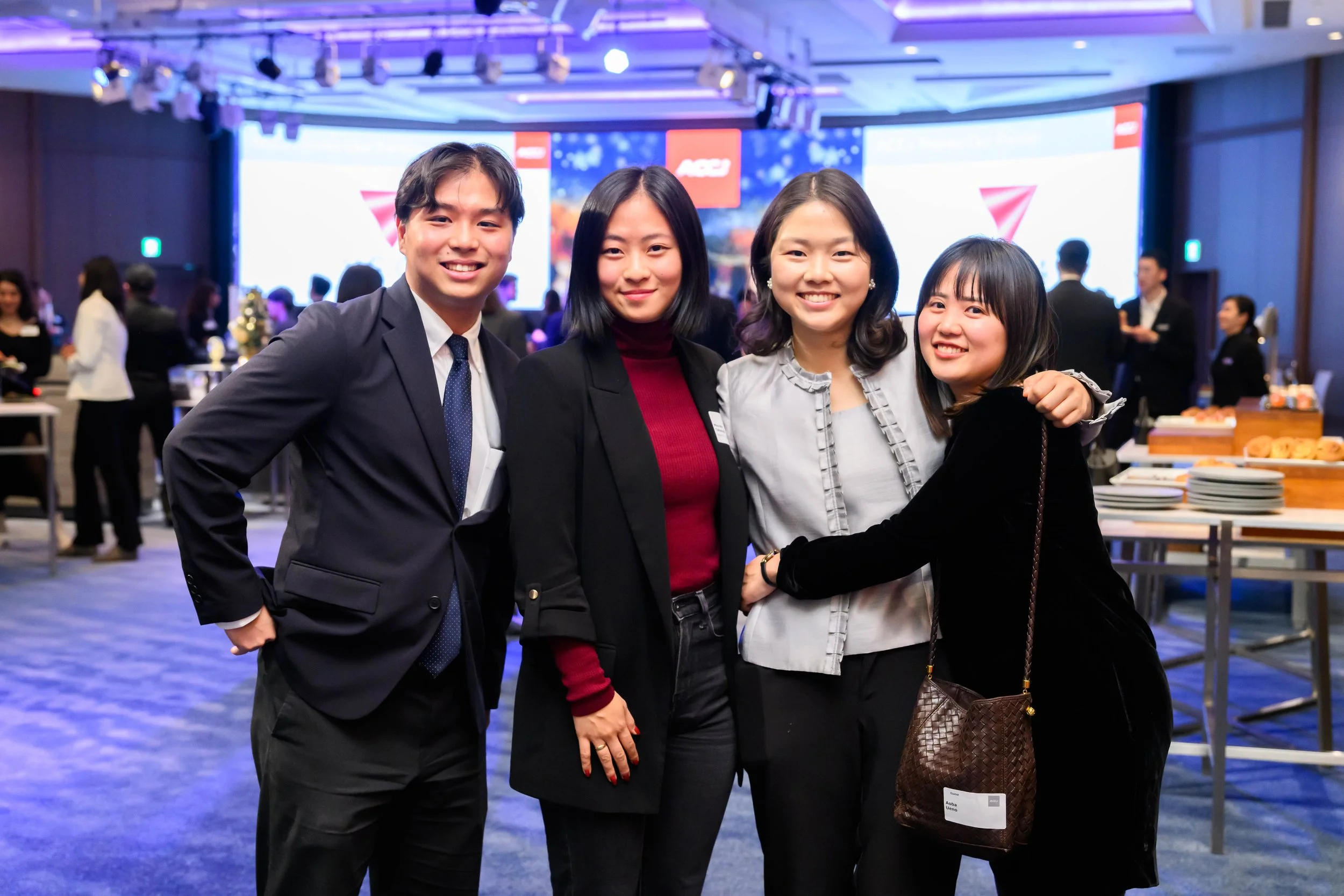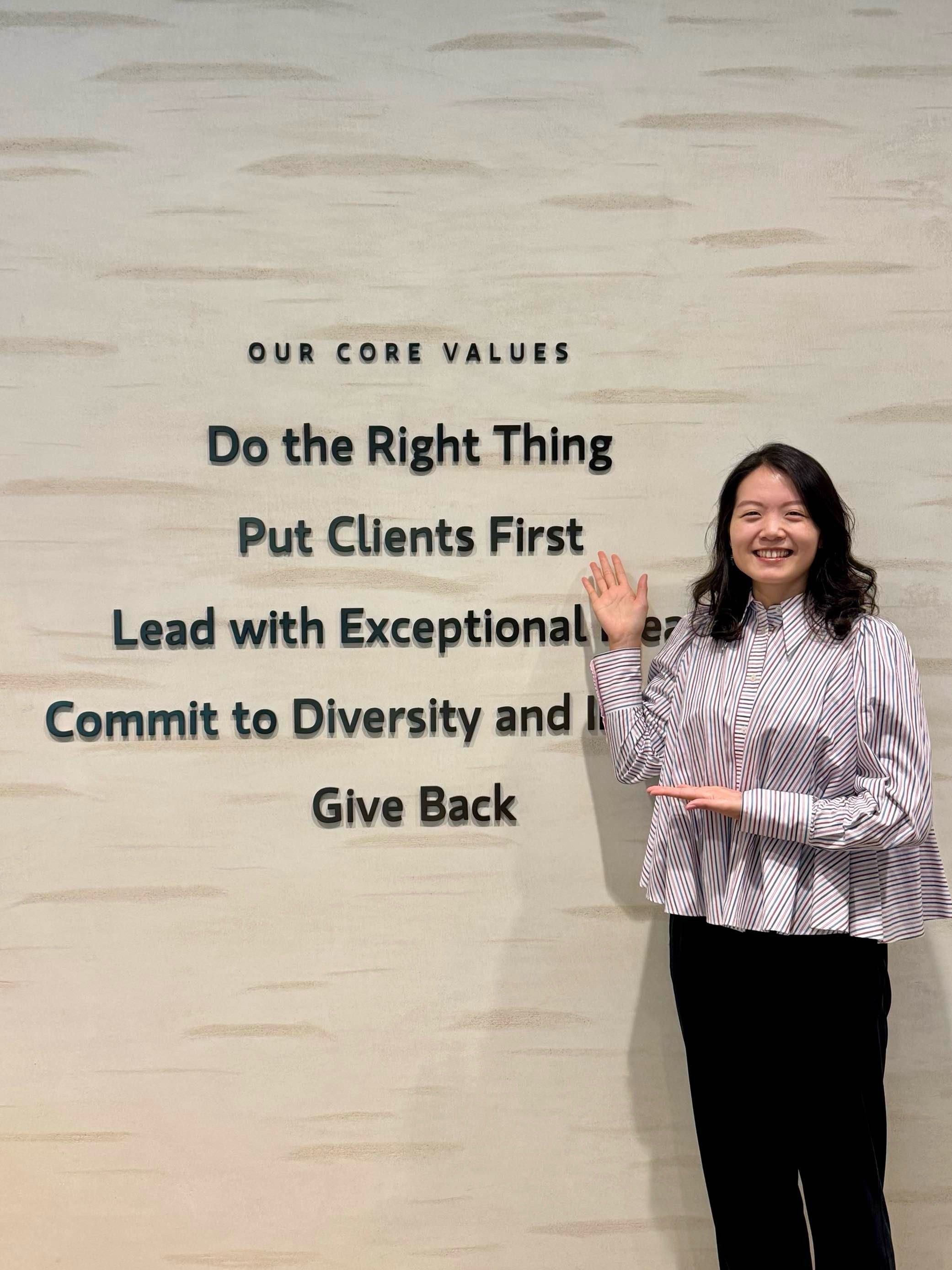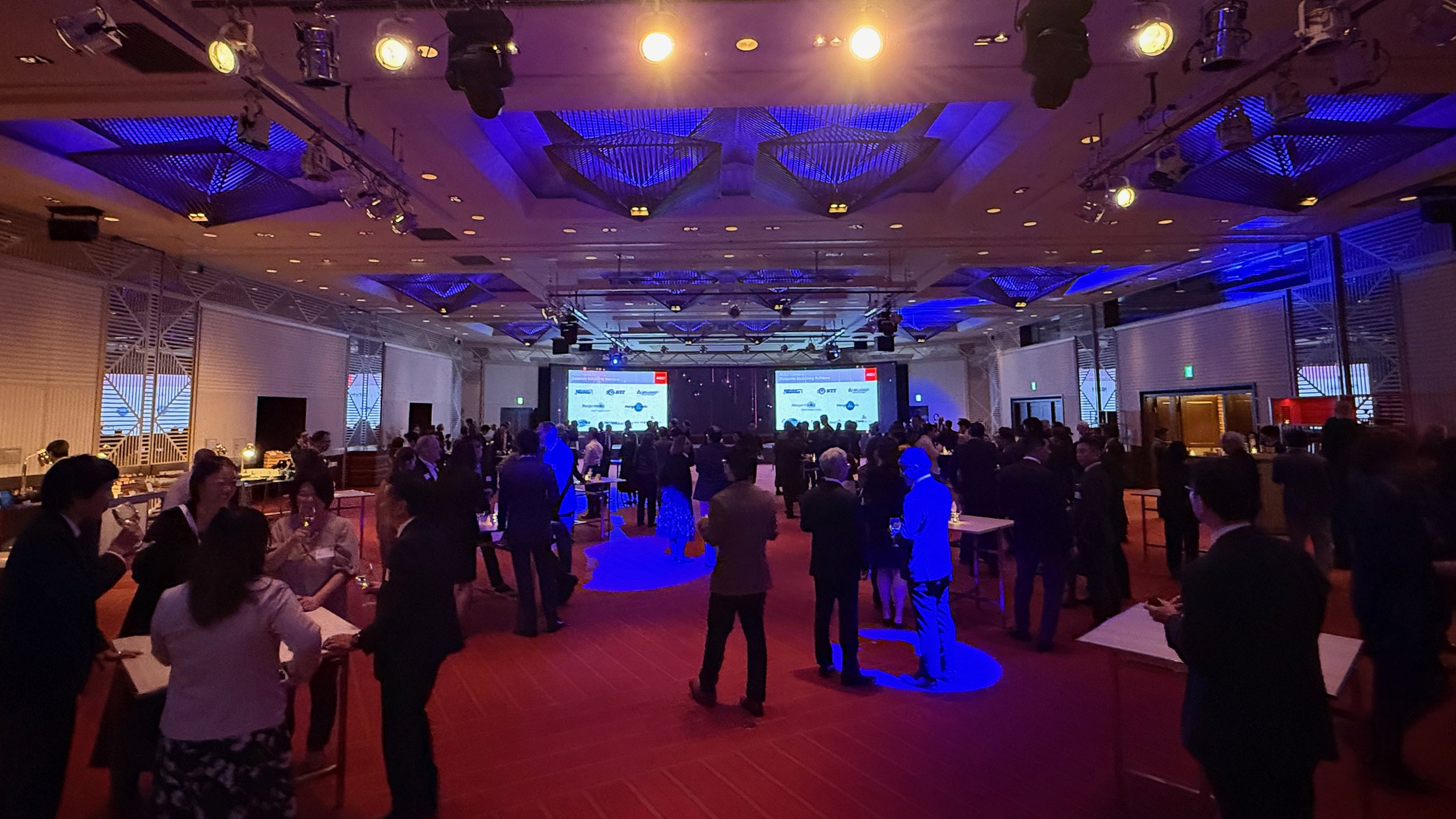An Evening of Connection and Appreciation
Members of the American Chamber of Commerce in Japan (ACCJ) and their guests gathered in the Hilton Tokyo’s Kiku Ballroom on December 11 to close out 2025 with its final signature event of the year.
The ACCJ closes out 2025 with a festive night of networking and honors.
Photos by Miki Kawaguchi/LIFE.14
Members of the American Chamber of Commerce in Japan (ACCJ) and their guests gathered in the Hilton Tokyo’s Kiku Ballroom on December 11 to close out 2025 with its final signature event of the year.
ACCJ President Victor Osumi took to the stage against a starry backdrop to welcome everyone to An Evening of Connection and Appreciation, a formal cocktail-style reception that brought together nearly 300 ACCJ members and guests.
“As we gather tonight, it is an opportunity to reflect on a year filled with remarkable achievements,” Osumi said. “It is a chance to reflect on a tremendous year of activity at the chamber, thanks to the support of our members’ collective efforts. We want to celebrate this spirit of collaboration and excellence.”
Next, to mark the incredible dedication of chamber members, ACCJ Vice President Arthur Mitchell joined Osumi on stage to present the 2025 ACCJ Leaders and Volunteers of the Year awards.
Also joining the festivities was 2025 ACCJ Person of the Year Ambassador William E. Grayson. He was honored for his leadership in advancing the US–Japan partnership as commissioner general of the USA Pavilion at Expo 2025 Osaka, Kansai.
“To receive this award from all of you brings an incredible amount of joy and happiness,” said Grayson, who shares more about the six-month experience of welcoming visitors to the USA Pavilion.
With formalities concluded, attendees indulged in the Hilton Tokyo’s culinary artistry and smooth jazz while making new connections for 2026.
Young Professionals to Watch: James Greatrick
The FGS Global corporate communications consultant shares he has benefited from ACCJ connections, mentorship, and events.
The FGS Global corporate communications consultant shares he has benefited from ACCJ connections, mentorship, and events.
The Young Professionals Forum (YPF) serves as a platform to connect working professionals aged 35 and under within the American Chamber of Commerce in Japan (ACCJ). In this installment of our Young Professionals to Watch series, we talk to James Greatrick, senior associate at FGS Global, about the real-life lessons he has learned by participating in YPF events, which go beyond traditional networking to give young professionals opportunities to learn directly from senior ACCJ members in intimate settings.
What do you do at FGS Global?
I work as a corporate communications consultant for FGS Global, helping companies navigate Japan’s unique communications landscape. My day-to-day involves working with leading companies—both Japanese and international—to develop narratives, messaging, and strategies that can resonate with a wide array of stakeholders, be it media, investors, C-suite executives, employees, the general public, or, in many cases, all of the above.
What is the most memorable project you have worked on? How did being a young professional make a difference?
While most client projects are confidential, we recently supported a major US company’s entry into the Japan market by developing their local narrative strategy. Our team led stakeholder interviews across Japan and the United States to craft messaging that balanced local market needs with global brand consistency, contributing to a widely successful market entry.
For me, growing as a young professional has been about recognizing the unique strengths my position gives me, whether it is offering a unique perspective on a certain issue, serving as a mentor to junior team members, or recognizing the importance of digital and new media in corporate communications. While there will always be doubts when comparing your knowledge with that of industry veterans who have decades of experience, having the confidence to recognize when your unique skill set or perspective can be valuable is crucial.
How does FGS Global empower young professionals?
The best part of working at FGS Global has been being able to develop my career alongside the growth of our Tokyo office. There is an atmosphere of momentum that permeates our daily work, and we are regularly being brought into new projects or faced with new and exciting challenges. Being part of an agile and growing team has empowered me to develop specialized expertise in areas that I am passionate about, such as tech and digital communications. We are constantly on the lookout for driven young professionals in Tokyo, and I cannot think of a better place to kick-start a career in corporate communications.
Do you have a memorable moment from a YPF or ACCJ event?
A particularly memorable experience was the CEO Forum and Young Professionals reverse mentoring event, in which we sat down with ACCJ business leaders for interesting—and sometimes frank—conversations about the ways in which Japanese companies can empower young professionals. The event flipped the script on typical interactions between young professionals and senior executives, facilitating a variety of memorable conversations on topics such as new technology, work–life balance, professional development, and employee retention.
What are your expectations for the YPF and the ACCJ?
I hope that young professionals can be more involved in the ACCJ at all levels. The learning experiences and connections I have made at YPF and ACCJ events have been invaluable to my personal and professional development, and I strongly encourage ACCJ members at all levels to invite their junior employees to take part in upcoming events. You never know when a connection made at an ACCJ event could lead to new business opportunities!
Young Professionals to Watch: Sepideh D. Firouzjah
The PhD candidate shares how the ACCJ has helped her pursue innovations in science.
The PhD candidate shares how the ACCJ has helped her pursue innovations in science.
The Young Professionals Forum (YPF) serves as a platform to connect working professionals aged 35 and under within the American Chamber of Commerce in Japan (ACCJ). In this installment of our Young Professionals to Watch series, we talk to Sepideh D. Firouzjah, a PhD candidate at the Institute of Science Tokyo, about the real-life lessons she has learned by participating in YPF events, which go beyond traditional networking to give young professionals opportunities to learn directly from senior ACCJ members in intimate settings.
What do you study at the Institute of Science Tokyo?
I completed my undergraduate studies in sports physiology and sports nutrition, followed by a master’s degree in medicine in sport and exercise at Tohoku University, supported by a full scholarship from 2022. During this time, I also joined Tokyo Medical and Dental University as a research student, which later became the Institute of Science Tokyo. I advanced to a PhD program in the Department of Biosignals and Inheritance, affiliated with the School of Dentistry, in 2024.
My master’s research focused on oligodendrocytes, the brain cells responsible for supporting nerve communication. Building on this foundation, I have expanded my work to examine how parental experiences can influence offspring through changes in gene regulation. My current research specifically investigates how exercise triggers chemical modifications in cells—known as lactylation—that occur across different cell types. These modifications appear to play a role in enhancing learning abilities and improving the way the body regulates energy and metabolism.
What is the most memorable project you have worked on? How did being a young professional make a difference?
One of the most memorable projects I worked on was my research exploring how exercise impacts brain and metabolic function through epigenetic changes. It was exciting because it gave me the chance to connect my background in sports science with cutting-edge research in neuroscience, and it showed me how deeply lifestyle factors can influence health across generations. This project also gave me a sense of purpose, as I could see how my work might contribute to future approaches in preventive medicine.
As a young professional, this experience helped me grow by pushing me outside my comfort zone. I had to adapt to new techniques, learn how to communicate across disciplines, and manage challenges with limited experience. These moments, instead of holding me back, gave me confidence and resilience, and shaped the way I approach research and collaboration today. Most importantly, it taught me that growth often comes from embracing challenges and being open to continuous learning.
How does your university empower its young professionals?
The best part about studying at the Institute of Science Tokyo is the strong interdisciplinary environment. I appreciate how the university brings together researchers from different backgrounds. This creates opportunities for me to learn beyond my own field and inspires innovative approaches to complex problems. In addition, the institute provides excellent facilities and organizes high-level conferences, often inviting Nobel Prize laureates and pioneering scientists, which allows candidates to directly learn from leaders in the field. The collaborative atmosphere, combined with access to such opportunities, makes it an ideal place to grow both as a researcher and as a professional.
The university also empowers young professionals by offering mentorship, cutting-edge laboratories, and international networking. Beyond research, it provides courses connected to industry, including business and international health, which helps candidates expand their perspectives and skill sets. As a PhD candidate, I feel encouraged to explore my ideas while also receiving guidance that strengthens my research. This balance of independence, resources, and support helps early-career researchers develop the skills and confidence needed to contribute meaningfully to science and society.
Do you have a memorable moment from a YPF or ACCJ event?
I have had many valuable experiences through YPF and ACCJ events, particularly in building networks and engaging in meaningful conversations with international professionals in Japan. These opportunities have allowed me to learn from diverse career journeys, exchange perspectives across industries, and develop a stronger understanding of how professionals navigate challenges and growth in a global environment.
One event that left a strong impression on me was Female Diplomats Driving Women’s Empowerment in Global Politics and Business. Listening to female diplomats from three countries share the challenges they have faced in their careers and personal lives was both inspiring and thought-provoking. Their stories not only highlighted the common struggles women encounter but also reflected how cultural and national contexts shape those experiences. For me, this was particularly meaningful because it underscored the importance of women’s leadership and empowerment, which resonates deeply with the role of women in advancing both business and science.
What are your expectations for the YPF and the ACCJ?
First, I sincerely appreciate the opportunities that the YPF and wider ACCJ community provide to young professionals. The platform fosters meaningful connections across diverse industries and cultures, allowing emerging professionals to exchange ideas, broaden their perspectives, and build networks that support both personal and professional growth.
I hope the YPF and the ACCJ can further strengthen support for startups by organizing targeted events and workshops focused on entrepreneurship, scaling businesses, and navigating both the Japanese and US markets. Connecting young professionals with CEOs and industry leaders, providing mentorship, networking, and access to resources—as well as promoting cross-industry collaboration and international exchanges—can empower startups and emerging professionals to innovate and make a meaningful impact in both local and global business landscapes.
Young Professionals to Watch: Kaho Hasegawa
The World Kinect business development executive shares how the ACCJ has helped her grow her career.
The World Kinect business development executive shares how the ACCJ has helped her grow her career.
The Young Professionals Forum (YPF) serves as a platform to connect working professionals aged 35 and under within the American Chamber of Commerce in Japan (ACCJ). In this installment of our Young Professionals to Watch series, we talk to Kaho Hasegawa, business development executive at World Kinect, about the real-life lessons she has learned by participating in YPF events, which go beyond traditional networking to give young professionals opportunities to learn directly from senior ACCJ members in intimate settings.
What do you do at World Kinect?
I work in business development, focusing on the early stages of client engagement. My role involves introducing our services to potential clients, understanding their energy and sustainability needs, and handing off leads to the sales team. I also contribute to marketing—organizing webinars, writing for newsletters, researching companies, and updating website content. Having lived in Japan, Singapore, and Canada, I value the global nature of our business and the opportunity to work with people from different cultures and backgrounds.
What is the most memorable project you have worked on? How did being a young professional make a difference?
One of the most memorable projects so far has been participating as the Asia-Pacific host in a global webinar series. Each region—North America, Europe, and Asia-Pacific—had a team with presenters and hosts, and I supported the session from our region. It was my first time taking part in a global, client-facing initiative, and I worked closely with marketing, sales, and subject-matter experts. Coordinating efforts across teams and hosting the session itself was a challenge, but the strong engagement and follow-up from participants made it very rewarding.
At this stage in my career, I have found that approaching things with a fresh perspective can be a strength. I am comfortable asking questions or suggesting changes. For instance, I identified gaps in our Japanese landing page and took initiative to improve it. At the same time, limited experience can be frustrating, especially when I cannot immediately answer complex client questions. However, I see that as part of the learning curve, and it motivates me to keep learning.
How does World Kinect empower young professionals?
I really appreciate the accessibility and support across the company, regardless of role or location. The people are approachable and open to sharing their expertise. I have learned a lot by working with colleagues from different departments and regions—from origination to marketing to operations. It is encouraging to be part of a team where knowledge is shared, and young professionals are trusted with responsibilities that allow us to grow and contribute meaningfully.
Do you have a memorable moment from a YPF or ACCJ event?
I have attended both, and each has given me something valuable. The YPF events help me connect with others at similar career stages, and it is reassuring to discover that many of us share similar challenges and goals. One especially memorable experience was the Sales Support Alliance session, where we learned how to shape professional and company messages into concise, powerful narratives. I realized how important storytelling is—not just to hold someone’s attention, but to leave a lasting impression. Practicing in small groups made the session interactive, and I left feeling more confident and equipped for real-world conversations.
What are your expectations for the YPF and the ACCJ?
I am interested in more opportunities that offer practical skill-building and cross-industry networking. Events that offer hands-on learning—such as improving communication or building confidence—as well as opportunities to learn about different industries are especially helpful. I would also love to attend more casual or cross-chamber events, which make it easier to meet new people outside one’s immediate field.
Young Professionals to Watch: Sean Hill
The Share-Me founder shares how the ACCJ has helped him grow his start-up in Japan.
The Share-Me founder shares how the ACCJ has helped him grow his start-up in Japan.
The Young Professionals Forum (YPF) serves as a platform to connect working professionals aged 35 and under within the American Chamber of Commerce in Japan (ACCJ). In this installment of our Young Professionals to Watch series, we talk to Sean Hill, founder and chief executive officer of Share-Me, about the real-life lessons he has learned by participating in YPF events, which go beyond traditional networking to give young professionals opportunities to learn directly from senior ACCJ members in intimate settings.
What do you do at Share-Me?
We’re a start-up reinventing the business card—beginning with beautifully designed, NFC-enabled smart cards that let you share your digital business card with a simple tap or QR scan. From social links to contact info and files, everything you want to share is instantly accessible. And we’re evolving into a seamless platform for digital business cards and lead management built for the way people connect today.
Before launching Share-Me, I studied entrepreneurship and marketing at George Washington University. I have always been passionate about building things from the ground up, and my goal is to become a leading entrepreneur who represents both our generation and Japan.
What is the most memorable project you have worked on? How did being a young professional make a difference?
Launching Share-Me has been way more challenging than I ever imagined. I started the company from scratch as a young, inexperienced founder with no business network in Japan. That came with obvious hurdles like building trust, earning credibility, and figuring things out as I went.
However, it also gave me a fresh perspective and the freedom to build something based not on bias but on real customer feedback. Being a young professional has allowed me to take bold risks and given me the hunger and resilience to keep pushing forward, even when things get tough.
How does Share-Me empower young professionals?
The best part about working at Share-Me is being part of a young, global team that’s building something from the ground up. It’s exciting to create a product or feature that thousands of customers are using.
Everyone on the team, no matter their background, is trusted with real responsibility—and not just to the company but to the customers and partners who believe in us. We’re not only supporting a vision, we’re actively shaping it together, which is exciting.
Do you have a memorable moment from a YPF or ACCJ event?
One of my most memorable ACCJ events was the year-end bonenkai [the Networking for Tomorrow event]. It was a great mix of fun and meaningful conversations, and I had the chance to connect with leaders from all different industries. What really stood out was how encouraging people were about the challenges I’m taking on, and I was very happy that they were interested in what we’re building and had good things to say about our products. It made me feel supported and reminded me how valuable this community is.
At my first YPF event, I was impressed by the energy in the room. There was this strong sense of ambition, and I felt everyone was driven, passionate, and eager to grow—even though many of us are still early in our careers. It felt like being surrounded by future leaders, and that kind of environment is both inspiring and motivating.
What are your expectations for the YPF and the ACCJ?
One of the core visions behind Share-Me—and something that drives me personally—is encouraging what is called “chosen” in Japanese, the courage to take on new challenges, especially among young professionals.
Share-Me isn’t just a tool for exchanging business cards; it’s a way to share your chosen. We’re offering the courage to share your story and build real connections beyond surface-level exchanges.
I hope the YPF and the ACCJ continue to create spaces where these stories are heard, where young professionals feel inspired to act, and where meaningful collaboration can grow. As a founder, I deeply value opportunities for mentorship, peer connections, and greater visibility within Japan’s business ecosystem.
Fresh Perspectives
ACCJ Governor Connor Myers shares his journey to becoming the chamber’s youngest current board member.
ACCJ Governor Connor Myers shares his journey to becoming the chamber’s youngest current board member.
When the American Chamber of Commerce in Japan (ACCJ) held its election last November, Connor Myers, a member of the Young Professionals Forum (YPF), became the youngest current member of the Board of Governors. The ACCJ Journal spoke with Myers about the real-life lessons he has learned by participating in ACCJ events and running for the chamber’s governing body.
How did you become involved in the ACCJ?
I was introduced to the ACCJ in 2015 while interning at the US Embassy, Tokyo. I had the opportunity to support embassy officials at ACCJ events, assisting with tasks such as note-taking and logistics. Later, in 2019, after transitioning to a US tech company, I joined the ACCJ. I became increasingly involved through committee activities, event organization, and engaging with advocacy efforts, and in 2023 was invited to serve as a vice-chair of the Digital Transformation Committee.
What led you to run for governor?
My decision was prompted by a conversation with a member of the Nominations Committee. Before that, I honestly wasn’t sure that my qualifications were good enough and hadn’t fully considered myself for the role. But their confidence in my potential, combined with a clearer understanding of the board’s responsibilities, convinced me to give it a shot. I saw it as a chance to contribute more directly to the ACCJ’s direction, collaborate with respected leaders, and gain valuable experience.
How does the board empower young professionals?
I feel that the board views young professionals as an essential part of the chamber and the future of the US business community in Japan. Without their contributions, committees would lack the diverse viewpoints needed for innovative problem-solving, so the board places great value on their diverse perspectives and the significant energy they bring to committee work and chamber initiatives.
It’s important to provide young professionals with growth opportunities to develop into leaders. To do this, the board has approved a special individual membership rate for those under 30 and is engaged in connecting young professionals with mentors.
Do you have a memorable moment from an ACCJ event?
My most memorable moment was when I organized and moderated an event about facilitating the digital transformation efforts of the Japanese police. With the help of the US Embassy, we brought together representatives from the National Police Agency (NPA), who were interested in exploring technological solutions, to talk to ACCJ members from companies offering relevant products, services, and insights.
Based on member input, I developed a presentation that included recommendations for the NPA and case studies demonstrating the successful implementation of digital transformation for US law enforcement. I gave the presentation in both English and Japanese, as if I was doing consecutive interpretation of myself.
What do you hope to achieve as a governor?
One of my goals is to make it easier for young professionals and small company members to participate in ACCJ activities. I’d like to look closely at guidance for new members to see if there are ways to reduce friction that may be preventing participation to ensure that members get the most out of their membership.
I think the YPF will play a key role in achieving many of the board’s objectives. This year, the board is continuing its work on refining committee structures to encourage broader participation and enhance the effectiveness of our advocacy. The active involvement and innovative ideas of young professionals are crucial for the success of these efforts.
Young Professionals to Watch: Ina Enatsu
Morgan Stanley associate Ina Enatsu shares how the company’s culture and programs have helped her grow personally and professionally.
The Morgan Stanley associate shares how the company’s culture and programs have helped her grow personally and professionally.
The Young Professionals Forum (YPF) serves as a platform to connect working professionals aged 35 and under within the American Chamber of Commerce in Japan (ACCJ). In this installment of our Young Professionals to Watch series, we talk to Ina Enatsu, a company management associate at Morgan Stanley Japan Holdings Co., Ltd., about the real-life lessons she has learned by participating in YPF events, which go beyond traditional networking to give young professionals opportunities to learn directly from senior ACCJ members in intimate settings.
What do you do at Morgan Stanley?
I work as a member of the Alliance Office team in our Company Management division. The team plays an integral role in strengthening the alliance between Morgan Stanley and Mitsubishi UFJ Financial Group, Inc. (MUFG), including advancing collaboration between Morgan Stanley and MUFG’s two securities joint venture entities in Japan. Morgan Stanley and MUFG have a strategic and capital alliance that started during the 2008 global financial crisis with MUFG’s $9 billion capital injection into Morgan Stanley.
Our team has a wide variety of key responsibilities. For example, my teammates and I keep our global senior management up-to-date with information on the Japan joint venture, MUFG, competitors, and industry updates to support informed decision-making. Additionally, we remain on the lookout for new opportunities to collaborate, actively supporting ideas that emerge from across various divisions of Morgan Stanley and MUFG.
Before my current position, I worked on the mergers and acquisitions team in the Investment Banking Division and was always fascinated by how individuals’ determination can influence firm-wide decisions. Now, I am one of those individuals, focused on strengthening the alliance between Morgan Stanley and MUFG to ensure that projects and collaborations progress and continue in a meaningful way.
What is the most memorable project you have worked on? How did being a young professional make a difference?
I joined Morgan Stanley’s Alliance Office team last May and have been constantly surprised by how closely I work with senior management. For example, we are directly involved in planning and execution of the Global Steering Committee, which hosts a face-to-face meeting twice a year between the Morgan Stanley and MUFG executive teams, including both chief executive officers.
A particularly memorable project is the monthly update report that our team creates and sends to senior leadership. While this is a routine task, I enjoy the opportunity for young professionals to bring creativity to it. Without going into specifics, as it is an internal document, I once proposed an analysis from a new perspective. Although it involved many hours of work, my team appreciated it, and it was included in one of the editions sent to our senior global leadership.
How does Morgan Stanley empower young professionals?
I value a lot of Morgan Stanley’s focus on culture and—at its foundation—I believe that everyone’s ideas are expected to be shared. Specifically, I want to highlight two initiatives, among many, that have been particularly valuable to me.
The first is our Firmwide Mobility opportunity. Employees can apply for transfers, which I see as a great way for young professionals to reflect on their skill sets, consider life events, and leverage mobility to build a long-term career. As I mentioned, I started my career in another department and received tremendous support through both my team and the mobility opportunity.
The second is the Open Doors Program, which is designed to connect employees with senior leadership. I have participated in several sessions hosted by senior leaders where young professionals are given an excellent opportunity to directly ask questions and share their views.
Do you have a memorable moment from a YPF or ACCJ event?
I joined an off-the-record event organized by the YPF, which was a memorable experience. Despite the presence of many senior executives, I felt at ease—likely because the event was genuinely designed to foster open communication between executives and young professionals.
I had the opportunity to meet inspiring, open-minded leaders and was pleasantly surprised to see how eager executives were to hear young people’s perspectives on work, motivation, and other topics.
What are your expectations for the YPF and the ACCJ?
My hope for the YPF is that it continues to create meaningful, well-intentioned events that raise awareness among young professionals and encourage a sense of accountability.
In a world where artificial intelligence can handle tasks, it is essential for us to speak up, share perspectives, and take action to improve society. Even though I have only attended two YPF events, I have already met several exceptional young professionals, which reinforces my belief that this is a valuable network. I hope to see it continue in a sustainable and impactful way.
Making a Difference
The ACCJ Journal also spoke to Enatsu’s manager, Yuki Hasegawa, about her presence and contribution.
“Ina joined my team last May and quickly became an integral member, thanks to her proactive approach to both work and team-building. I see her consistently thinking from the stakeholders’ perspective, striving to drive progress in her role,” said Hasegawa, who is the managing director and head of the Alliance Office. “As a culture-carrier, her strong sense of values and commitment to fostering a positive culture are exceptional.
“I am very much excited personally—and as a member of the Morgan Stanley Japan management—that she is being featured here and shows a presence among the YPF,” Hasegawa continued. “I have always believed that passion-based external networking activities provide a place for us to be exposed to a diverse set of role models, and to then also experience the many ways in which we can all be a leader. I like the authentic nature of the YPF initiatives which I have learned about from Ina and hope she continues to stay actively involved, discovering her own strengths, lifting others, and encouraging talent to join our firm.”
Young Professionals to Watch: John Marasigan
En World Japan Senior Consultant John Marasigan shares how the ACCJ has helped him step forward and grow .
The en World Japan senior consultant shares how the ACCJ has helped him step forward and grow
The Young Professionals Forum (YPF) serves as a platform to connect working professionals aged 35 and under within the American Chamber of Commerce in Japan (ACCJ). In this installment of our Young Professionals to Watch series, we talk to John Marasigan, a senior consultant at en world Japan, about the real-life lessons he has learned by participating in YPF events, which go beyond traditional networking to give young professionals opportunities to learn directly from senior ACCJ members in intimate settings.
What do you do at en world Japan?
As a consultant, I partner with executive leaders across all industries in Tokyo to solve complex challenges by offering interim talent solutions to their finance teams. My aim is to build genuine, lasting relationships and to become a trusted leader, both within my organization and across my professional network.
What is the most memorable project you’ve worked on? How did being a young professional make a difference?
Through a YPF introduction, I connected with a founder of a renowned marketing company. What began as a mentorship request evolved into an opportunity to assist with key challenges, including introducing adviser-level professionals for his executive team.
Unfortunately, after presenting several potential advisers, the company decided to move forward with another option. This experience reinforced an important lesson: even with the best of intentions, outcomes may not always align with expectations. But it was a valuable opportunity to practice humility.
How does en world Japan empower its young professionals?
At en world Japan, I get to drive and grow my own business while benefiting from a supportive corporate framework—truly the best of both worlds. It’s a great fit for anyone with an entrepreneurial spirit who values the structure and resources of an established organization. You’ll have access to a warm network, a robust database, and a reliable back-office team—all working together to ensure your success.
Do you have a memorable moment from a YPF or ACCJ event?
Meeting with Dave Powell, the vice president and general manager of Disney+ in Japan, was a highlight. The office setting and lunch bento boxes were nice touches, but what truly mattered were the practical, eye-opening insights he shared. I especially appreciated his advice on volunteering for tasks others avoid—an effective way to build reliability and responsibility within your organization. Access to leaders like Dave is what makes the YPF group special; it fosters conversations that go far deeper than the surface-level exchanges typical at most networking events.
What are your expectations for the YPF and the ACCJ?
I hope the YPF and ACCJ will invest more in younger professionals. That means making events more accessible, providing hands-on guidance, and offering real encouragement—especially for those new to networking. With Japan’s declining population and aging workforce, it is vital that we focus on developing tomorrow’s leaders. Let’s give them the spotlight, meaningful responsibilities, and the support they need to step forward and grow.
Making a Difference
The ACCJ Journal also spoke to Marasigan’s manager, Adrian Lee, about his contributions.
“John exemplifies the qualities of a highly driven and ambitious professional, characterized by a profound dedication to continuous learning, refinement of his expertise, and the cultivation of meaningful professional networks,” said Lee, senior manager of en world Japan’s Contract Professionals Division. “Organizations such as the ACCJ and groups like the YPF serve as invaluable platforms, fostering environments where individuals like John can excel and further distinguish themselves within their industries. By offering access to thought leadership, expert-led seminars, and collaborative workshops—alongside opportunities for interaction with like-minded business professionals—the events they host provide the resources that underpin John’s consistent excellence as a top performer within our firm.”
Lee also noted how Marasigan has distinguished himself in an industry often marked by transactional exchanges by adopting a consultative approach.
“He prioritizes building genuine rapport with clients, gaining a nuanced understanding of their specific needs, and delivering tailored insights and market intelligence,” Lee said. “This approach empowers clients to make strategic, well-informed decisions regarding their hiring objectives, and reflects John’s unwavering commitment to elevating professional standards and outcomes.”
Young Professionals to Watch: Sari Koyama
Kraft Heinz Japan Digital Marketing Manager Sari Koyama shares how she cultivates lasting connections with Kraft Heinz customers and YPF members.
Digital marketer cultivates connections at Kraft Heinz Japan
The Young Professionals Forum (YPF) serves as a platform to connect working professionals aged 35 and under within the American Chamber of Commerce in Japan (ACCJ). This is the first in our Young Professionals to Watch series, which will spotlight active YPF members who are making waves in their respective companies and the chamber. For the inaugural edition, The ACCJ Journal sat down with Kraft Heinz Japan Digital Marketing Manager Sari Koyama to find out how she cultivates lasting connections with Kraft Heinz customers and YPF members.
What do you do at Kraft Heinz Japan?
I specialize in digital marketing. I originally worked as a member of the brand category team, creating strategy for products and activation for Heinz pasta and cooking sauces.
Since 2023, I have been the digital marketing manager, mainly focusing on digital consumer-facing communications, such as website and social media operations as well as campaign implementation to grow awareness of all our brands.
What is the most memorable project you’ve worked on? How did being a young professional make a difference?
In 2024, social media was one of our key focuses. It is an indispensable medium for the consumer journey that leads the expansion of brand awareness.
By transitioning to more strategic and efficient operations—as well as conducting regular campaigns, hopping on internet trends, and strengthening direct communication with consumers—more people became aware of our accounts and became Heinz fans.
I use many social media platforms outside work. I believe that an in-depth understanding of user behavior, based on personal experience, is a strength young professionals bring to a company.
How does Kraft Heinz Japan empower young professionals?
Heinz has a corporate culture that respects all opinions and judges ideas based on their content, regardless of a person’s age or experience. I believe that Heinz is a workplace where young professionals have many opportunities to realize their own ideas. Also, we are not overly attached to traditional ways of thinking and are always striving to make things better. This creates a good environment for young professionals.
Do you have a memorable moment from a YPF or ACCJ event?
The first event I attended was the YPF Cross-Chamber Speed Networking in 2023. It is not often that you are able to meet new people once you start working, but this event allowed me to connect with exciting and fun people from different industries, nationalities, and companies whom I would not have met if not for the YPF. I hope these connections will continue to inspire and encourage me both personally and professionally.
What are your expectations for the YPF and the ACCJ?
YPF members are passionate about their careers and eager to learn about things outside of their day-to-day lives. I am happy to have opportunities to connect with fellow young professionals at various events, exchange information, expand my worldview, and inspire others. Also, since this is an especially hard stage of life, where many of the decisions I make today will have a direct impact on my future, I hope to have more opportunities to talk to and learn from role models through the ACCJ.
Making a Difference
The ACCJ Journal also spoke to Steve Briggs, The Kraft Heinz Company’s president for Northeast Asia, about Koyama’s contributions.
“Koyama-san is an important part of Heinz Japan’s team, bringing a fresh and innovative approach to digital marketing,” said Briggs, who is also an ACCJ vice president. “Her understanding of social media trends and user behavior has been instrumental in expanding brand awareness and building a loyal consumer base.
“As a member of the ACCJ’s Young Professionals Forum, Koyama-san exemplifies the value of fostering connections and professional growth, both within the company and the broader business community,” he continued. “Her ability to navigate new ideas, collaborate across teams, and inspire others contributes to cultivating a vibrant culture where young professionals can thrive and innovate. Having someone like Koyama-san on the team not only drives results but also strengthens Kraft Heinz Japan’s position as a forward-thinking organization.”
Networking for Tomorrow
The ACCJ closed out 2024 with its final signature event of the year, an exciting night of networking and honors in the Hilton Tokyo's Kiku Ballroom.
The ACCJ closes out 2024 with an evening of honors and connections
The Kiku Ballroom at the Hilton Tokyo in Shinjuku erupted on December 5 with vivid lights, pulsing sounds, and the chatter of future business deals being made as the American Chamber of Commerce in Japan (ACCJ) closed out 2024 with its final signature event of the year.
ACCJ President Victor Osumi took to the stage to the beats of the Top Gun theme as he welcomed everyone to Bridging to the Future: Networking for Tomorrow, a cocktail-style reception that brought together more than 260 ACCJ members and guests.
“This event is a moment to recognize our achievements, strengthen our network, and express gratitude to all of you here—and also those not here tonight—who made 2024 a success,” said Osumi.
Next, to mark the incredible achievements of chamber members, ACCJ Vice President Sarah Bader, Vice President–Kansai Jiro Kawakami, and Vice President–Chubu Robert Roche joined Osumi on stage to present the 2024 ACCJ Leaders and Volunteers of the Year awards (more on page 13).
“It has been a tremendous year full of accomplishments and connections,” said Osumi as he closed out the presentation segment of the evening. “As we look to the future, let’s continue to forge partnerships and bring progress and grace to a future of excellence.”
With formalities concluded, attendees indulged in the Hilton Tokyo’s culinary artistry while enjoying the beats of DJ Milky B and forming new connections in Japan’s vibrant business community.
Emerging Talent
Finding a place in a community of seasoned executives can seem daunting. To make it easier, the chamber offers a platform tailored specifically for working professionals aged 35 and under.
Connect and gain insights through the Young Professionals Forum
Too often, institutions such as the American Chamber of Commerce in Japan (ACCJ) can seem inaccessible to young professionals. Finding a place in a community of seasoned executives can seem daunting. To make it easier, the chamber offers a platform tailored specifically for working professionals aged 35 and under.
The Young Professionals Forum (YPF) seeks to empower its members by engaging them in all aspects of ACCJ activities, including networking, information sharing, and advocacy. Through peer-led programs, mentorship, and training, the YPF nurtures future ACCJ leaders and helps them grow professionally and personally while expanding their networks.
Spotlighting Young Talent
As we head into 2025, we are pleased to pen the first in a series of columns that will delve into themes relevant to the ACCJ and offer fresh perspectives and insights from the younger generations. We will also feature interviews with up-and-coming talent making significant contributions to the ACCJ and the YPF in a “Young Professionals to Watch” series. The interviews will spotlight journeys, achievements, and aspirations, providing a platform for young professionals to have their voices heard by the wider ACCJ community.
In selecting those to be featured, the YPF is committed to maintaining an unbiased approach and a high standard of excellence. We aim to promote diversity in nationality, gender, and field to ensure fair representation. By highlighting a diverse range of young professionals, we hope to inspire and motivate others within the community.
Making Connections
In Japan, where doing business is deeply rooted in relationships and trust, fostering professional networks is crucial. For young professionals, the world of networking can seem opaque and hard to access. Many fear they cannot get their foot in the door. “How can I talk to someone so senior? I have nothing to offer,” is a common thought.
We are promoting events directly targeting young professionals to help them meet like-minded peers and speak directly with individuals they may normally not have access to.
The YPF has already hosted several successful events that have greatly benefited its members. These include:
- Speed Networking, where young professionals from various chambers of commerce in Japan meet and engage in rapid-fire networking sessions
- Mentorship events and panel discussions, where senior executives share their experiences and insights with younger members
- The Mentorship Series, which invites seasoned executives to a roundtable discussion with young professionals
These events have been instrumental in fostering a sense of community and providing valuable learning opportunities.
Recognition
This year also saw YPF Co-chair Tomoki Fukasawa named as one of the ACCJ’s Leaders of the Year. Fukasawa said: “I am extremely proud of what we have been able to achieve with the YPF and look forward to continuing our mission of making the ACCJ more attractive to younger professionals. I hope we can bring in more passionate young professionals and I look forward to seeing everybody at our events in 2025!”
Feedback and Support
As we promote young professionals within the ACCJ, we welcome feedback and support from the wider community through the ACCJ website or in person. We ask members reading this to promote and encourage younger talent in their companies to participate in YPF events and initiatives. Your insights and encouragement are invaluable as we strive to create a vibrant and inclusive platform for young professionals. Together, we can foster a culture of continuous learning, collaboration, and growth that benefits all ACCJ members.
Twenty Years of Links and Leads
The 20th edition of the North America–Europe Golf Challenge is set for October 4. Organized by the ACCJ, EBC, and CCCJ, the shotgun-style tournament tees up fun, food, drinks, prizes, and one of the year's best networking opportunities.
The Mercedes-Benz–Francis Ford Coppola Winery Cup strengthens business connections.
It started in 2001, on a sunny day in Honolulu. Robert Grondine and Erik Ullner had just completed a round on the Hawaii Kai Golf Course when Grondine, then president of the American Chamber of Commerce in Japan (ACCJ), had an idea. Could a tournament modeled after the Ryder Cup bring Tokyo’s foreign business community together? Ullner, then vice-chair of the European Business Council (EBC), loved the concept and brought it to EBC Chairman Richard Collasse.
“Our chairman was not a golfer, but he liked the idea because that sort of networking opportunity didn’t exist in those days,” recalled Ullner. “He said, ‘Erik, you’re the golfer, why don’t you arrange it together with the ACCJ?’”
The North America–Europe Golf Challenge was born.
The first outing was on September 26, 2003, at Atsugi Kokusai Country Club. Opened in 1959, the course in Kanagawa Prefecture continues to host the event to this day.
The 20th edition of the international battle will take place in Atsugi on October 4.
Organized by the ACCJ, the EBC, and, since 2013, the Canadian Chamber of Commerce in Japan (CCCJ), the shotgun-style tournament pits Team North America against the European national chambers of commerce and business associations in Japan that make up the EBC. Up to 72 golfers can play for each side. In some years, that has been stretched to 80.
Originally called the DaimlerChrysler Cup, the tournament was renamed the Daimler and Chrysler Cup in 2008, and then the Mercedes-Benz Japan Cup in 2010, as the title sponsor’s corporate structure evolved. In 2015, global lifestyle brand Cole Haan joined as cosponsor and the event became the Mercedes-Benz–Cole Haan Cup. Its sponsorship continued until the pandemic. In 2022, Thomson-Reuters co-sponsored.
This year, a new North American title sponsor comes aboard. California’s Francis Ford Coppola Winery will bring their Alexander Valley varietals to the course and after party.
“The 20th edition of the international battle will take place in Atsugi on October 4.”
The event is always competitive, with team scores based on the average of the top 80 percent of players. The winner is rarely ahead by more than 1.5 strokes. The smallest margin has been 0.06 strokes, demonstrating the very even matching of players.
This has led to a back-and-forth affair over the years. The European team won the first cup in 2003 before the North American team pulled off a three-peat in 2004, 2005, and 2006. The Europeans fought back, winning two of the next three (2007 and 2009) before the North Americans went on another roll, prevailing in 2010, 2011, 2012, 2013, and 2015. Not to be outdone, Europe has nabbed five of the past six titles: 2016, 2017, 2018, 2022, and 2023. The tournament was not played in 2020 and 2021 due to the coronavirus pandemic.
While this rivalry is fun, the real value, participants consistently say, is the networking and chance to build new relationships.
“I have played in the tournament 15 or so times over the years, including its first 11 years in a row,” said longtime participant Ryan Dwyer, a partner at the Tokyo office of K&L Gates. “The course is always in top shape, and I always enjoy the round and the networking party afterwards.”
Beyond networking, the tournament also supports the community. A fundraising component was added in 2006, and proceeds helped the YMCA Challenged Children Project—a program assists children with disabilities and special needs, offering them opportunities for inclusion, development, and participation in physical, social, and recreational activities—through 2022. This year, support will go to Unleash Potential, a non-profit organization dedicated to helping children with disabilities and challenges in Japan.
Prizes are also a popular part of the gathering, and the awards and raffle are a centerpiece of the post-competition party at the clubhouse. While top players have a chance to win performance prizes like high-end golf gear, all players have a shot at incredible prizes, such as wine and air tickets for international flights. With millions of yen worth of prizes being provided by this year’s sponsors, it is expected that no player will leave empty-handed.
More than 20 years after the seeds were planted in Hawaii, the North America–Europe Golf Challenge has blossomed into one of the most popular dates on the calendar for golfers of all levels in the business community. And as more Japanese players join, the opportunities for networking continue to grow. Grondine, who passed away in 2011, would no doubt be proud of what the ACCJ, CCCJ, and EBC task forces have nurtured.
If you’re a golfer, join the fun, enjoy the great on-course food and drinks, and find your next business connection. This is one event you shouldn’t miss!
Youthful Energy
Fresh ideas and youthful energy are the lifeblood of business and international relations, and the ACCJ is dedicated to nurturing rising talent through the Young Professionals Forum.
The ACCJ Young Professionals Forum opens doors for ages 35 and under.
Fresh ideas and youthful energy are the lifeblood of business and international relations, and the American Chamber of Commerce in Japan (ACCJ) is dedicated to nurturing rising talent through the Young Professionals Forum (YPF). An interactive platform for young, working professionals aged 35 and under, the YPF provides members with opportunities to actively engage in all aspects of the chamber’s activities, including networking, information sharing, and advocacy.
“The YPF is all about creating connections that bridge generations, industries, and more,” explained Melynie Yoneda, a vice-chair of the forum. “Members have the opportunity to interact with high-ranking leaders within the ACCJ, as well as network with peers that they might not necessarily be able to meet in their day-to-day jobs. And ACCJ corporate members are able to get fresh perspectives from YPF members.”
Co-Chair Kelly Langley said that the YPF “has worked closely with the Board of Governors to enhance engagement with young professionals and continue innovating to build the future pipeline of leaders and members.” He added that professional development and human resource challenges continue to be areas where the YPF aims to contribute.
“The YPF is all about creating connections that bridge generations, industries, and more.”
Events such as the Learning from Executives series, held in collaboration with the ACCJ CEO Forum, expand mentorship and training, helping members develop both professionally and personally.
Yoneda said she is grateful for the forum and the opportunities it opens up. “As a young professional in Japan, it is easy to get swept away in your day-to-day tasks or fall prey to tunnel vision,” she noted. Her favorite memory so far was a cross-chamber networking event last October that brought together members of eight foreign chambers of commerce. “There was a palpable energy in the room that radiated from the 80 young professionals eager to meet and network with their peers.” A similar event is planned for September 17.
“If anything, the YPF is a chance to interact with peers from all industries and walks of life,” Yoneda concluded. “Today, we may just be networking and eating pizza, but it is exciting to think that the connections we make will become the future leaders shaping the US–Japan relationship.”
Assisting Business
With an emphasis on teamwork the ACCJ Sales Support Alliance supercharges the chamber experience by bringing together members across industries to share connections, knowledge, and help one another build business success.
The Sales Support Alliance supercharges ACCJ members’ networking opportunities with monthly meetings and unselfish teamwork.
In many sports, one player basks in all the glory of a score while another enjoys lesser accolades for their assist. Ice hockey spreads the wealth a bit more with a secondary assist—the pass before the pass that leads to the goal—and all three players earn a point in their stats.
This emphasis on teamwork is the same idea that forms the foundation of the American Chamber of Commerce in Japan (ACCJ) Sales Support Alliance (SSA). Founded in 2019 by Sales Development Committee Co-Chairs Eric Wedemeyer and Kjell Yadon, the SSA is designed to add value for committee members and guests by setting up the assists that lead to a business win.
Wedemeyer and Yadon describe their committee as horizontal rather than vertical as it serves ACCJ members across industries and company types. This broad reach amplifies the network effects and helps the SSA “supercharge everybody’s ACCJ experience.”
As an organization built on community and networking, the lifeblood of the ACCJ is serving up opportunities to its members. The SSA infuses this with the unselfish teamwork that leads to long-term success. Members introduce each other to new contacts in the hope that those fellow members will find business, even if there is no direct benefit to themselves—the pass before the pass that leads to the goal.
“In a networking situation, when you meet a new person at an ACCJ event, someone you know could very well be of use to the person you’re talking to, it becomes a richer experience if seen as an opportunity to introduce not just yourself, but also your contacts,” explained Wedemeyer. “If that results in a valuable business connection between two other people, that’s great. It’s a nice thing to do, it feels good, and the introduction will get paid back over time.”
J.R. Best, an SSA regular, found himself on the receiving end of an assist a couple of years ago. “David Clement connected me with the athletic director at [the American School in Japan],” said the co-founder of Hawaii-based Sports Camp of America (SCOA). “His daughter ended up being a junior counselor at SCOA’s summer camp, and she was fantastic.”
“In a networking situation, when you meet a new person at an ACCJ event, someone you know could very well be of use to the person you’re talking to, it becomes a richer experience if seen as an opportunity to introduce not just yourself, but also your contacts.”
SSA meetings regularly feature alternating small-group sessions and large-group discussions where attendees refine their self-introductions, sharpen their listening skills, and practice introducing other members to the group. This creates a feedback loop that allows attendees to reflect on their message and understand if their main point is coming across. For Japanese salespeople, it’s a chance to build confidence presenting in English in a comfortable, supportive, informal setting.
“By explaining my business to the people around me, I am able to look at myself objectively—what I am doing now, what I want to do, whether I am overreaching,” said Naoki Hioka, president of translation and localization company MedicaLingual, Inc. Hioka feels he has been able to identify issues and find the best path forward for his business thanks to SSA meetings.
Another feature of SSA meetings is the “Expert Corner,” where participants share knowledge and tips on a sales topic of interest. Recent topics have included using generative AI as a sales tool and post-Covid changes in lead generation strategies. Because SSA members represent so many different industries and job descriptions, these discussions generate an illuminating range of perspectives.
The name Sales Support Alliance might lead some to assume that only salespeople stand to benefit from the meetings, but Wedemeyer and Yadon stress that this is far from the truth. More than half of attendees are not in formal sales roles.
“Everyone is selling something,” said Yadon. “Many of our attendees are running their own companies or are responsible for promoting a company function internally. Sales skills always come in handy.”
Kreston ProWorks Business Development Manager Luc Swamika shared how he has benefitted from an introduction made at an SSA meeting. “Through the program, we forged a strong, lasting partnership and developed a mutually beneficial referral system that’s driving value for both our companies. Most importantly, we’ve built a relationship of trust and deep understanding with a valued partner.”
“SSA meetings regularly feature alternating small-group sessions and large-group discussions where attendees refine their self-introductions, sharpen their listening skills, and practice introducing other members to the group. ”
SSA meetings are open to non-committee-members, and usually half of attendees are first-timers. But once in the door, many get hooked and thrive on repeat attendance, building relationships over time.
Wedemeyer and Yadon describe the SSA as a momentum machine. Month to month, the results may look piecemeal, with people coming in with different sales targets and networking expectations. But over time, the SSA’s connections multiply as members get to know one another and build the trust necessary to make new introductions with confidence.
That momentum changed a bit during the coronavirus pandemic. Like most groups, productivity waned as meetings were forced to go virtual. Now, the Sales Development Committee is rebuilding the SSA as the in-person gathering it was before Covid-19. With more and more members joining, setting up the assist and scoring the winning goal is within everyone’s reach.
The next SSA meeting will take place on May 22 in the American Room at Cambridge Innovation Center. If you enjoy the personal relationship building of business, or just want to get together to chat, the SSA is waiting for you.
Adapt, Innovate, Discover, Connect
One of the greatest strengths of our international business community is the varied experiences and skills of our members. I’m proud of the way in which the American Chamber of Commerce in Japan (ACCJ) has transitioned to a virtual environment that allows us to serve the needs of the membership through a robust schedule of events and meetings. But, during the pandemic, tapping into our network for a less formal exchange of ideas and expertise (the way we would during coffee breaks in more normal times) has been a challenge. This month, we’re launching a pilot project to help members discover and connect with other members.
New Wai Gaya platform supercharges ACCJ networking
One of the greatest strengths of our international business community is the varied experiences and skills of our members. I’m proud of the way in which the American Chamber of Commerce in Japan (ACCJ) has transitioned to a virtual environment that allows us to serve the needs of the membership through a robust schedule of events and meetings. But, during the pandemic, tapping into our network for a less formal exchange of ideas and expertise (the way we would during coffee breaks in more normal times) has been a challenge.
This month, we’re launching a pilot project to help members discover and connect with other members. We’re calling it Wai Gaya, a term coined by Honda Motor Company, Ltd. for their practice of convening impromptu meetings among colleagues. At these gatherings, everyone is encouraged to share their ideas—regardless of role or seniority. Wai wai gaya gaya is also a Japanese expression used to describe a lively environment, such as an izakaya, filled with conversation—the words being onomatopoeias meaning chatter—and that’s exactly what we aim to create among members.
Supercharged Networking
Maybe you’d like to find members who have experience negotiating rents with commercial landlords. Perhaps you want to bounce around ideas on a specific business challenge with members who are facing a similar issue. You may want to get some sound advice on how best to leverage your experiences in Japan to take the next step in your career as an expat. Or maybe you’re looking for new business partners and simply want to expand your network.
Using the Wai Gaya platform—developed in-house by the ACCJ—any member can suggest a topic for conversation. The topics will be promoted in our Insider email and can be reviewed on the Wai Gaya website. If you see a conversation in which you would like to participate, just click “I’m interested.” Once three members express interest, we’ll open the ACCJ’s Webex videoconferencing platform to schedule a meeting among up to 10 interested members. We’re keeping the number of participants low to ensure that all parties have a chance to interact.
Nimble Ideas
Inspired by the world of startups and minimum viable products, we’ve built Wai Gaya in-house using a “no-code” platform. This new capability allows us to test ideas without investing a lot of time or resources in their creation. If the membership sees value in Wai Gaya and engages with it, we’ll enhance the platform’s functionality. If it doesn’t take off, we’ll shift our efforts to other new ideas based on input and ideas from the membership.
Beyond Events
Planning and presenting formal events remains the responsibility of ACCJ committees. What Wai Gaya does is provide a venue for those topics and conversations which lend themselves better to conversation rather than presentation.
We all look forward to the day when we can return to in-person meetings, as well as the introductions and chats that happen over coffee during the in-between moments of our events. Our hope is that Wai Gaya will fill this need—at least in part—and that the Wai Gaya model might provide value to the membership even after we emerge from our current virtual mode.

